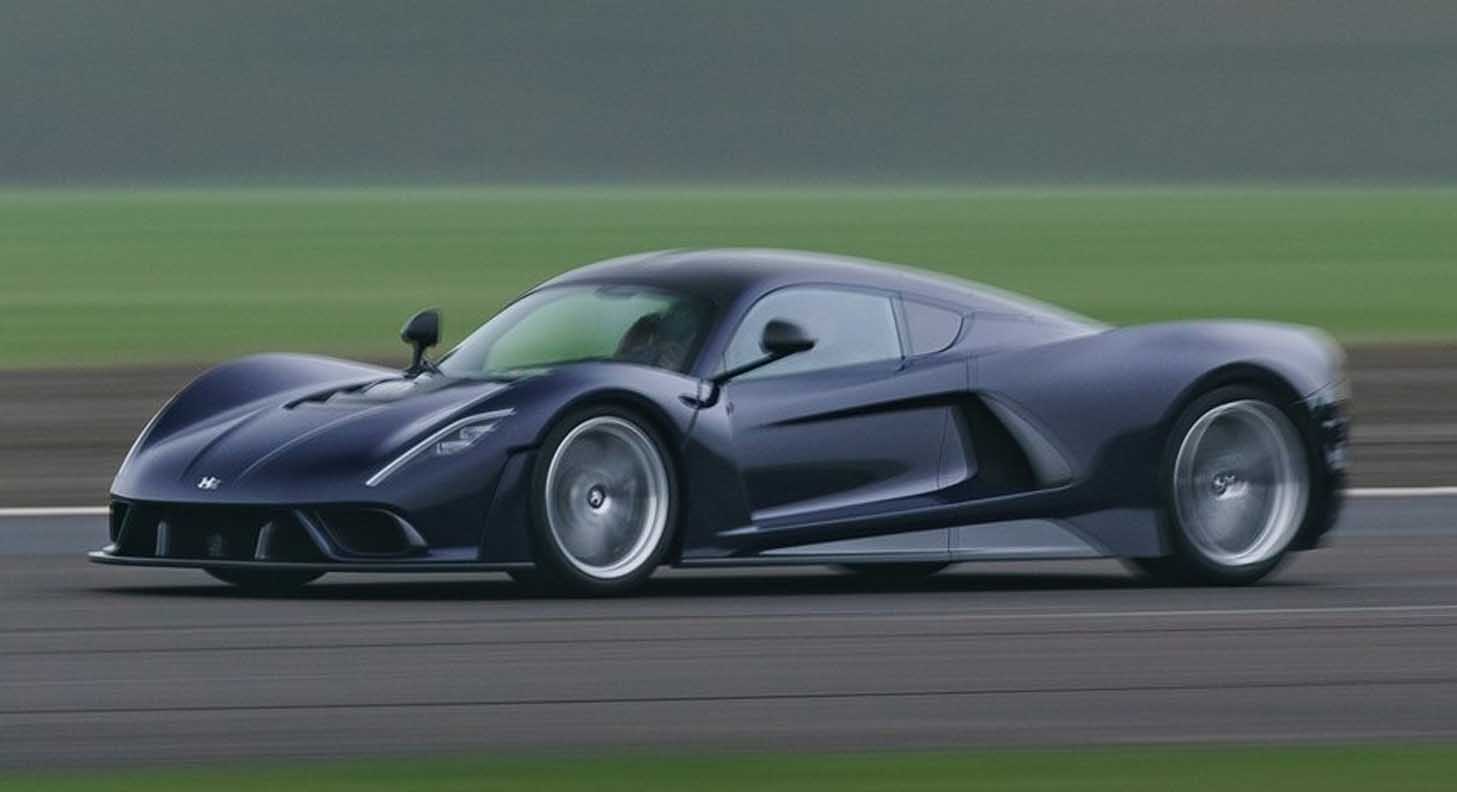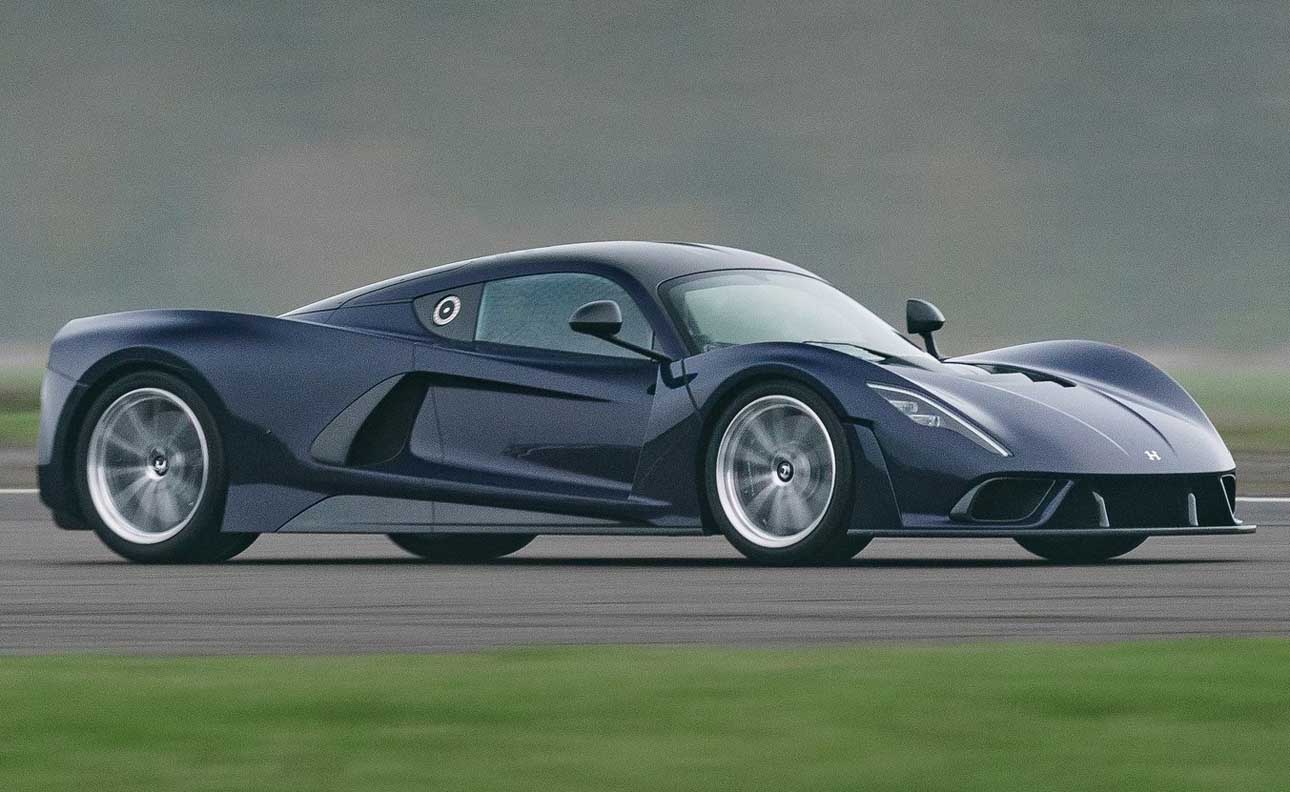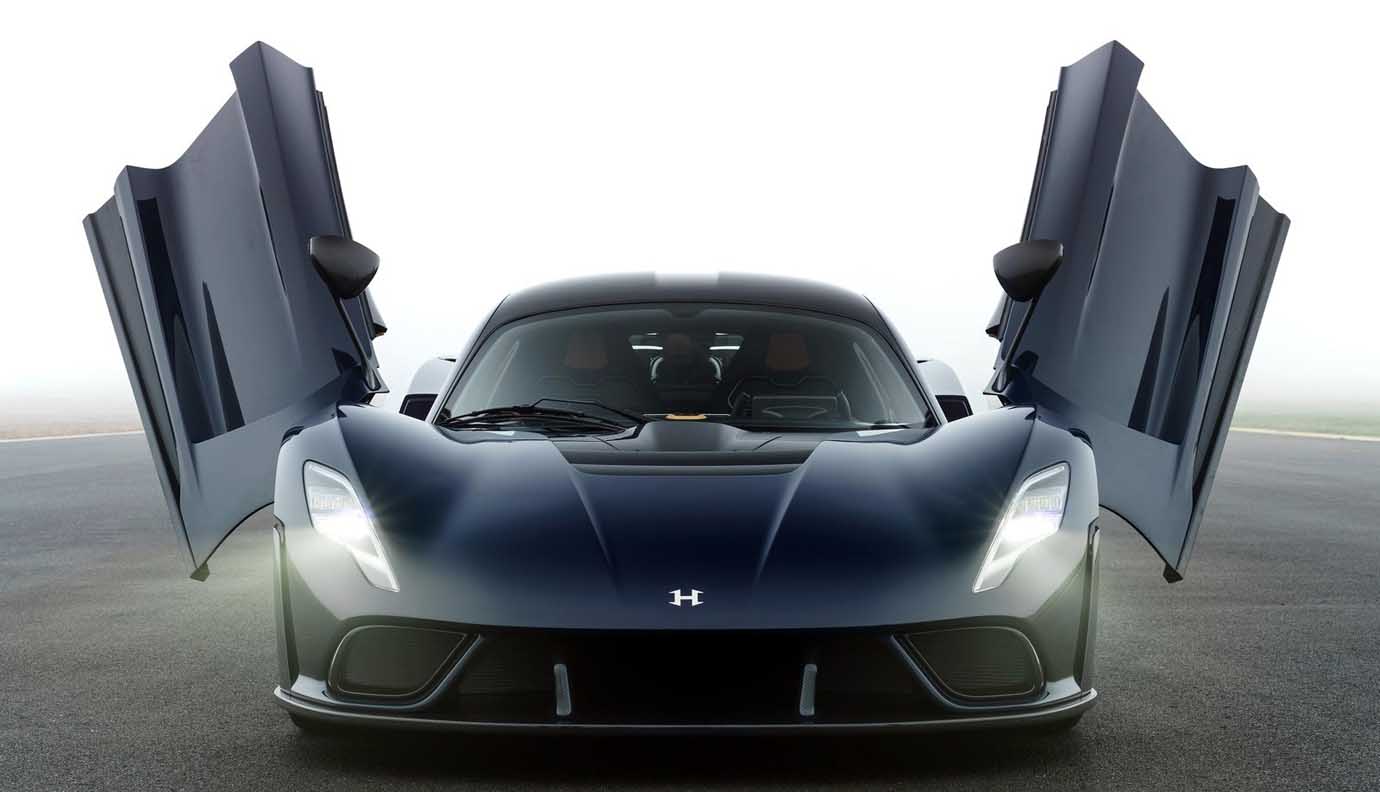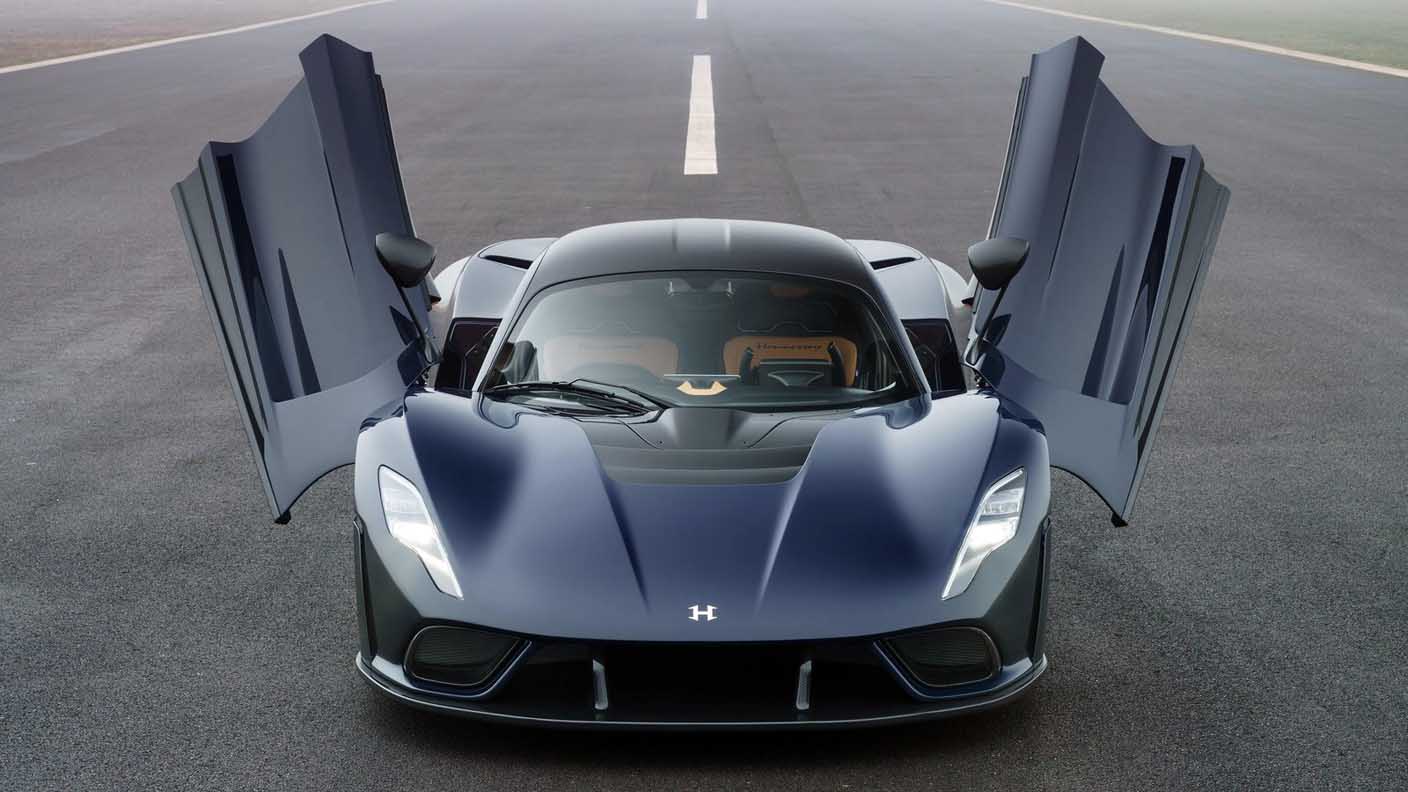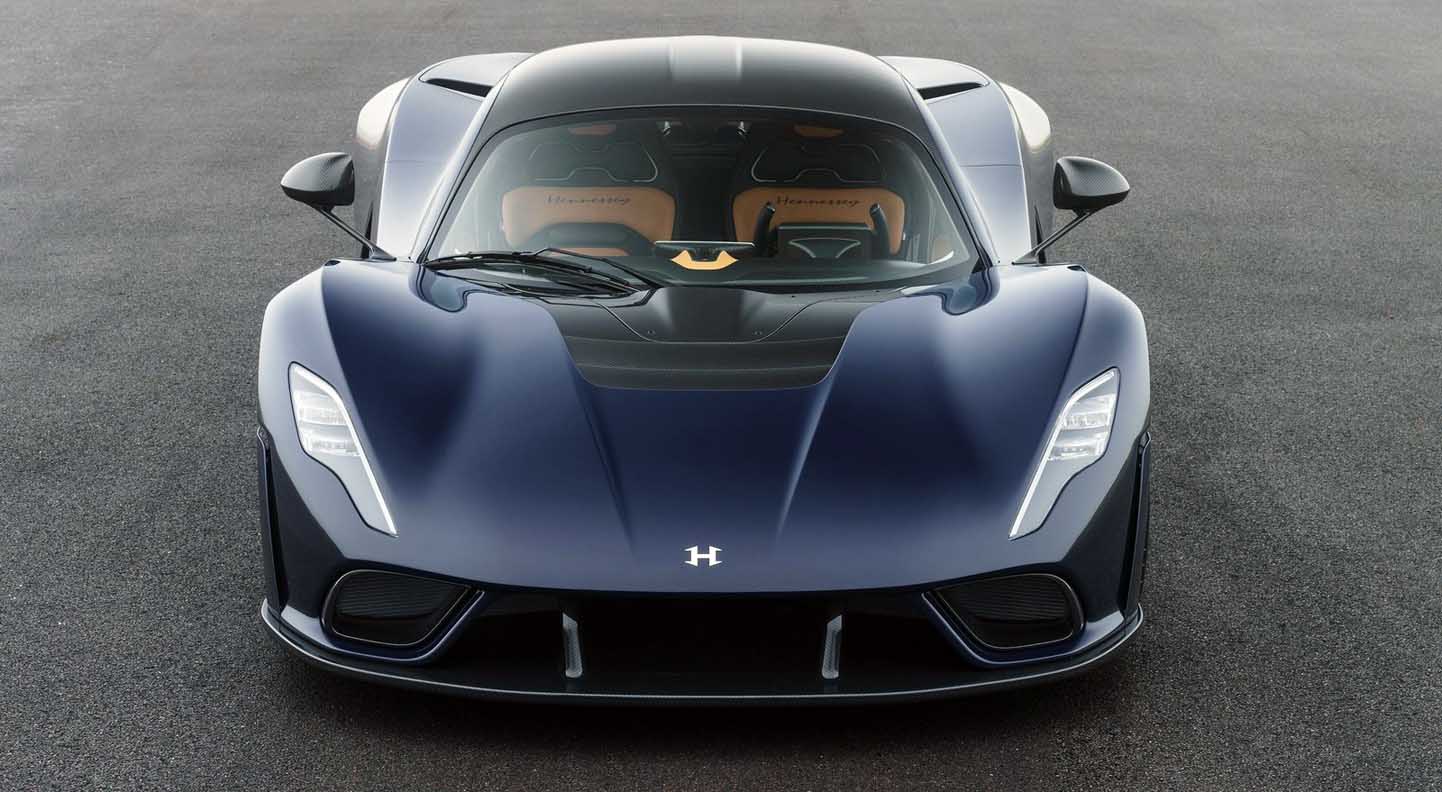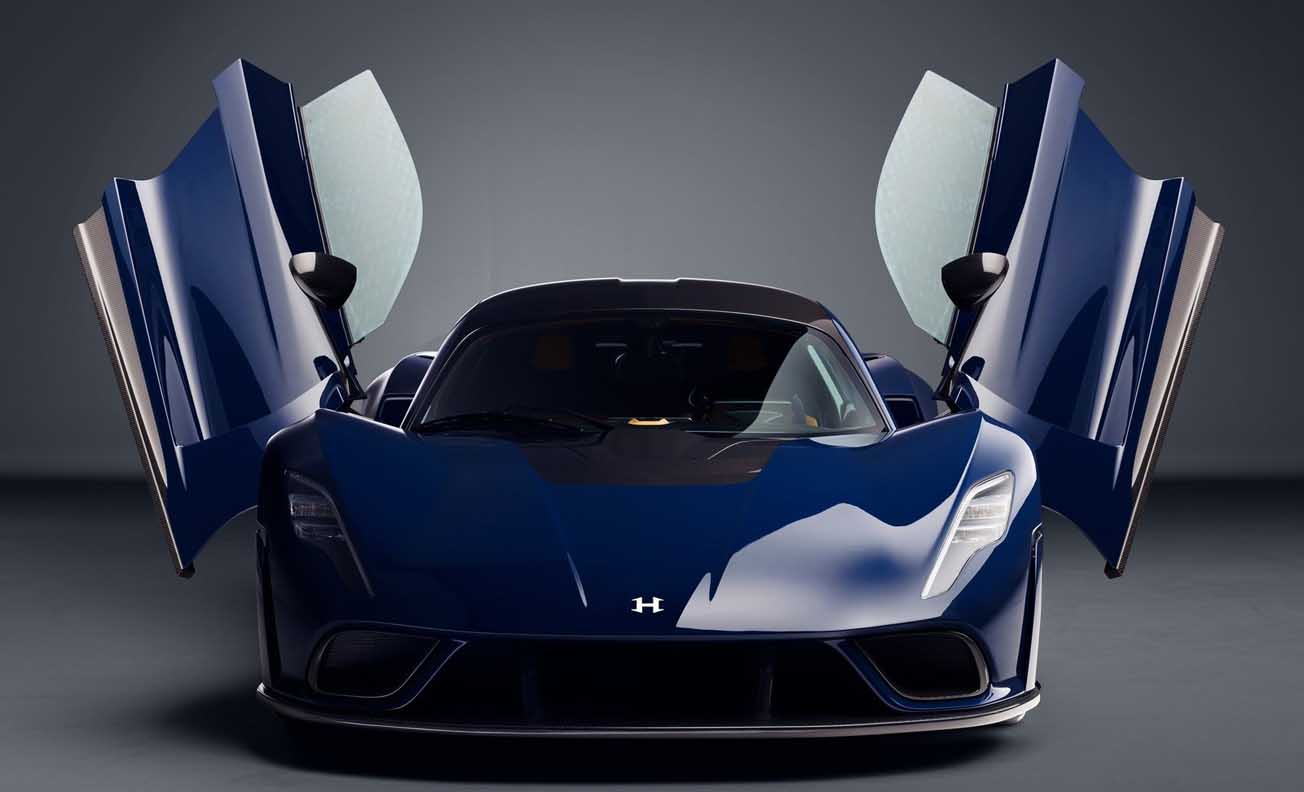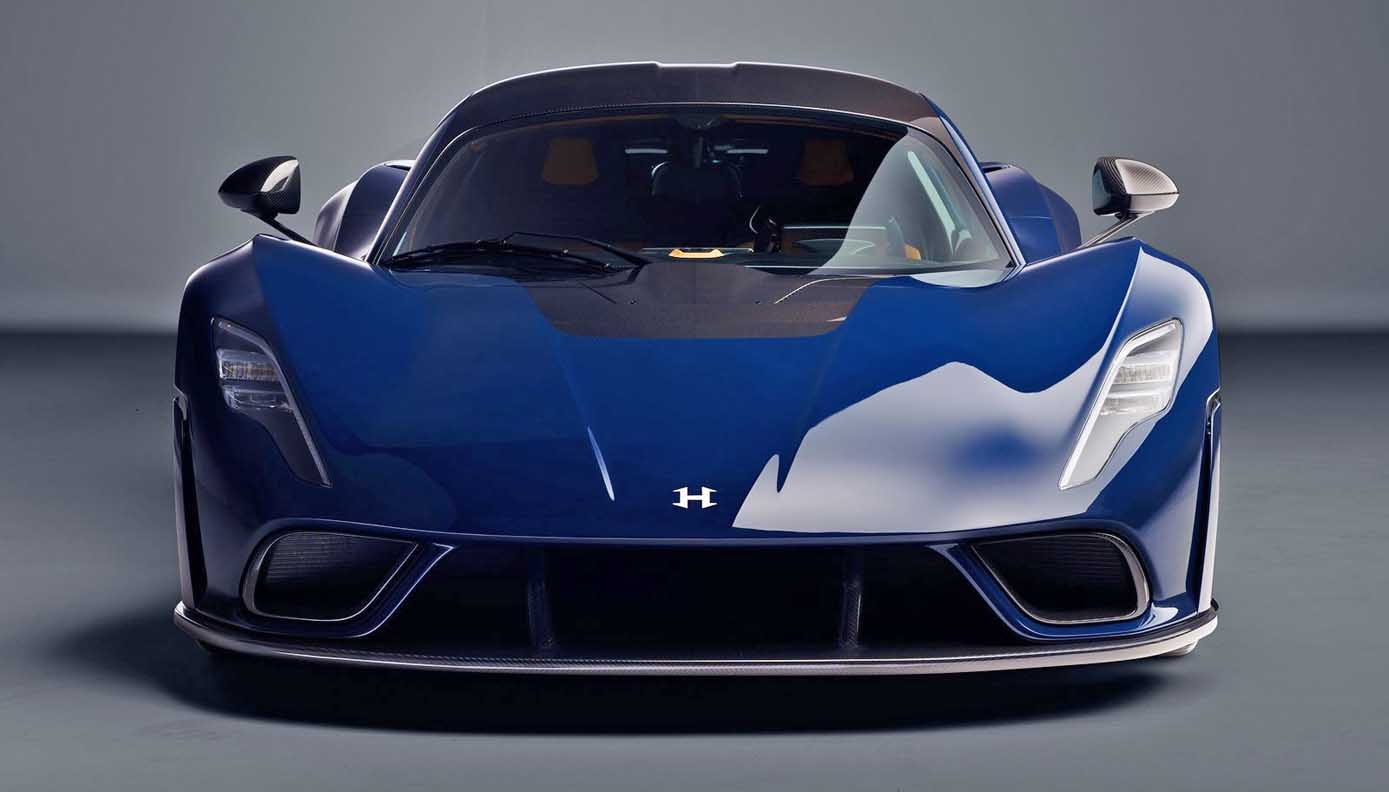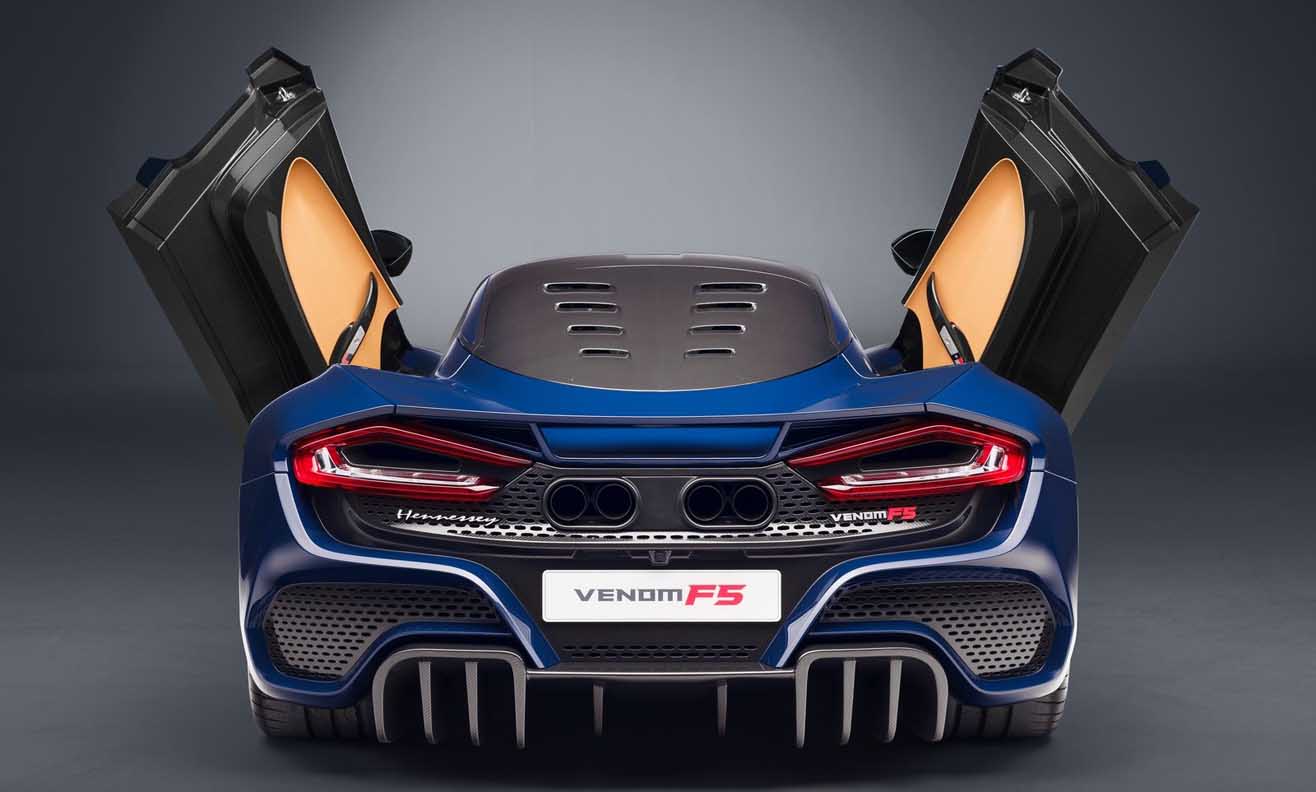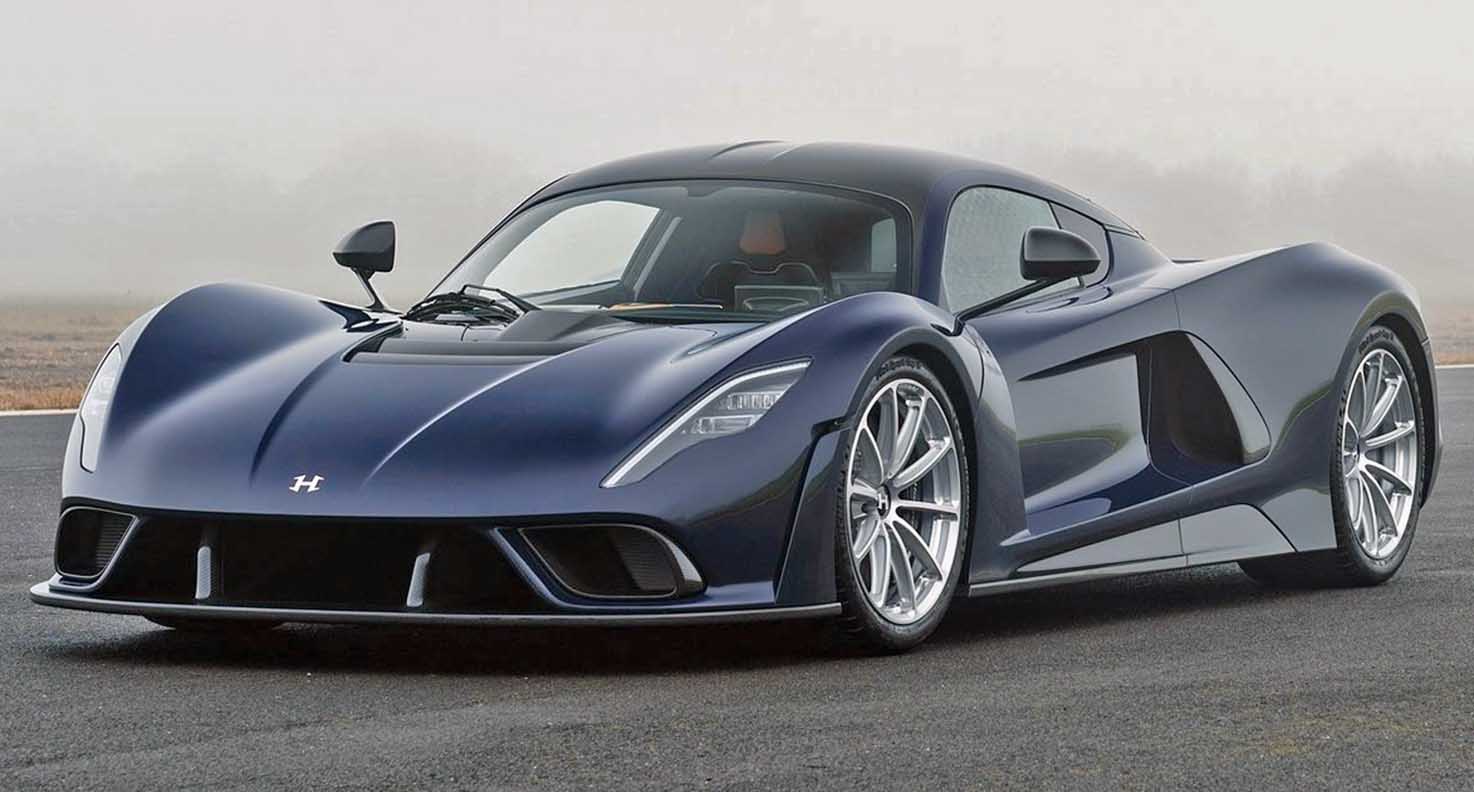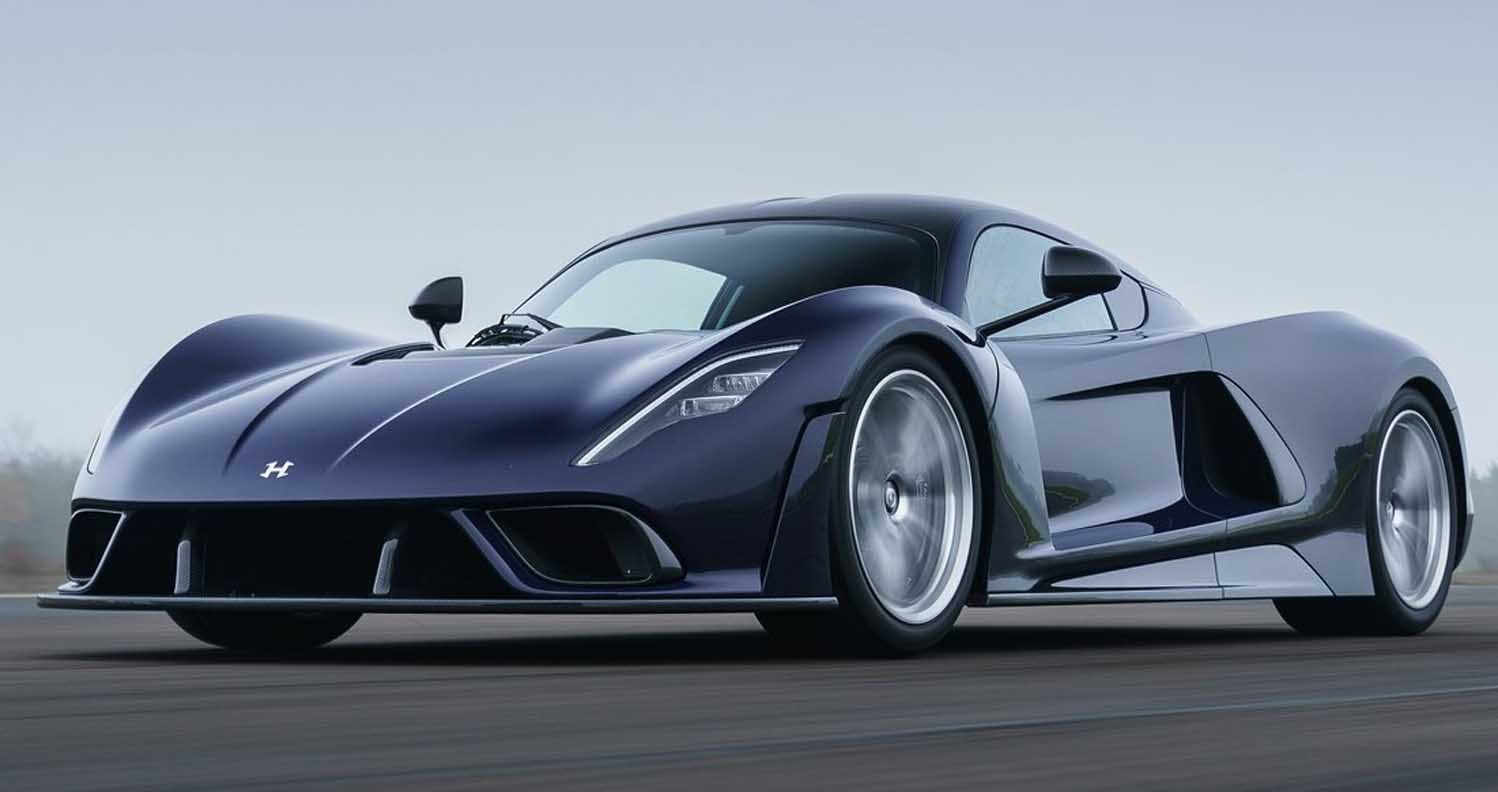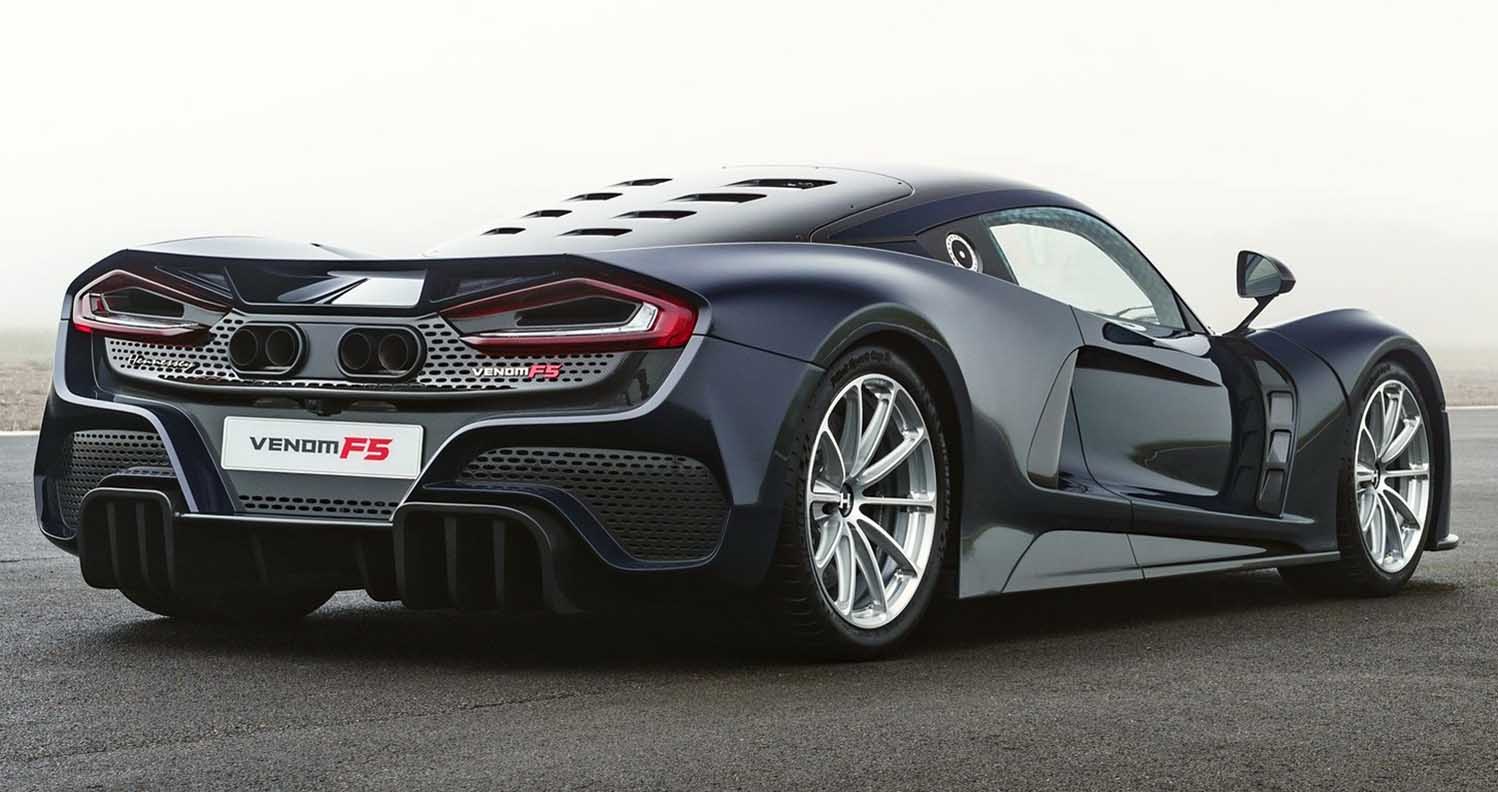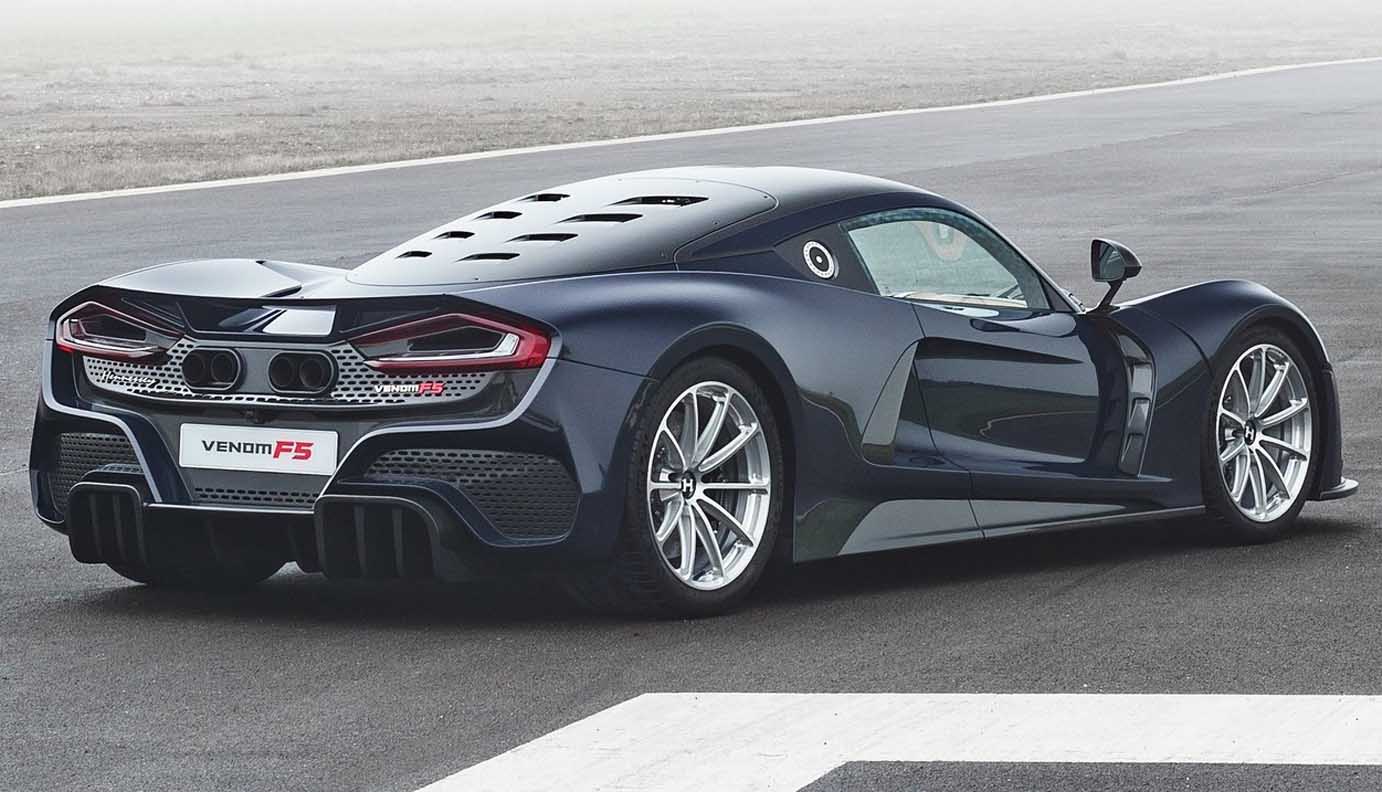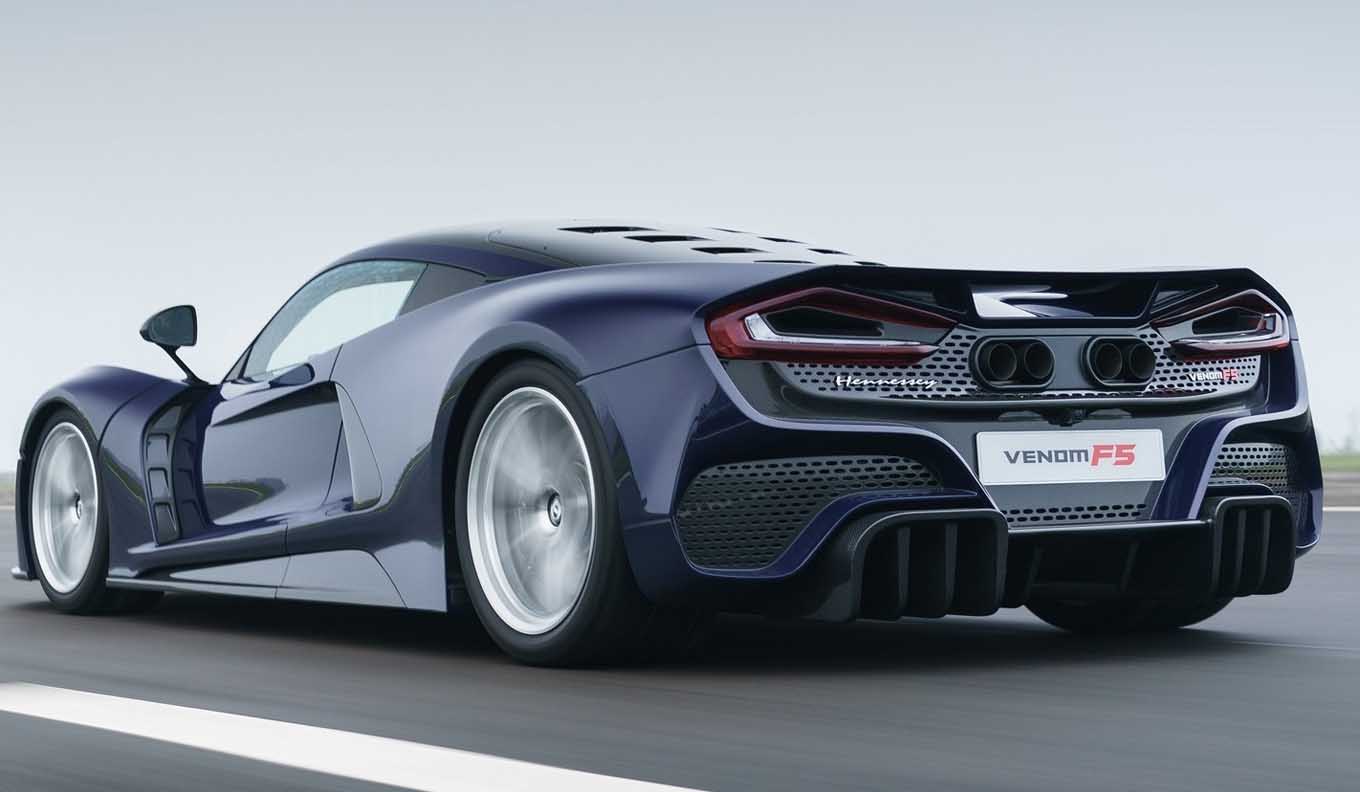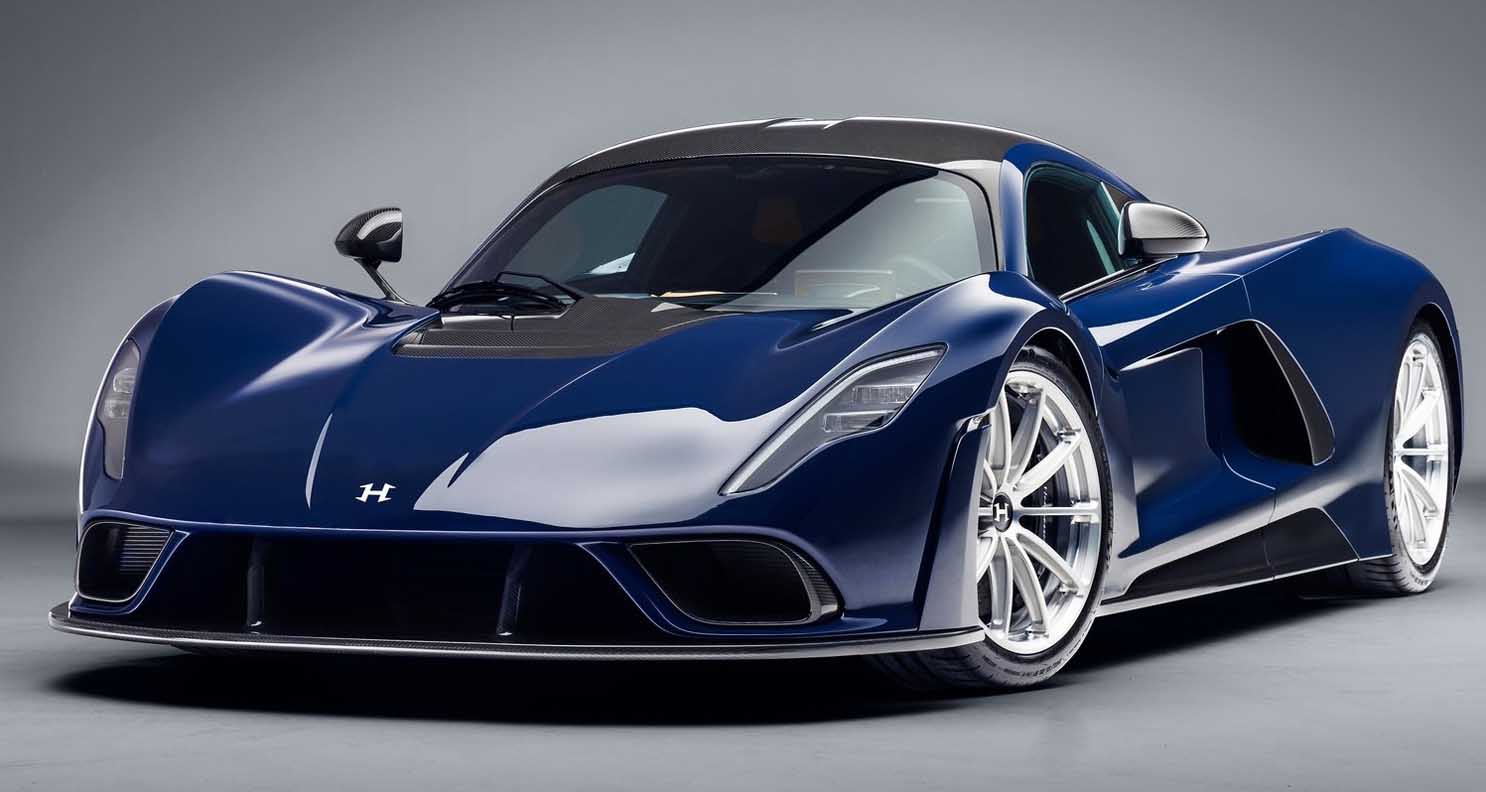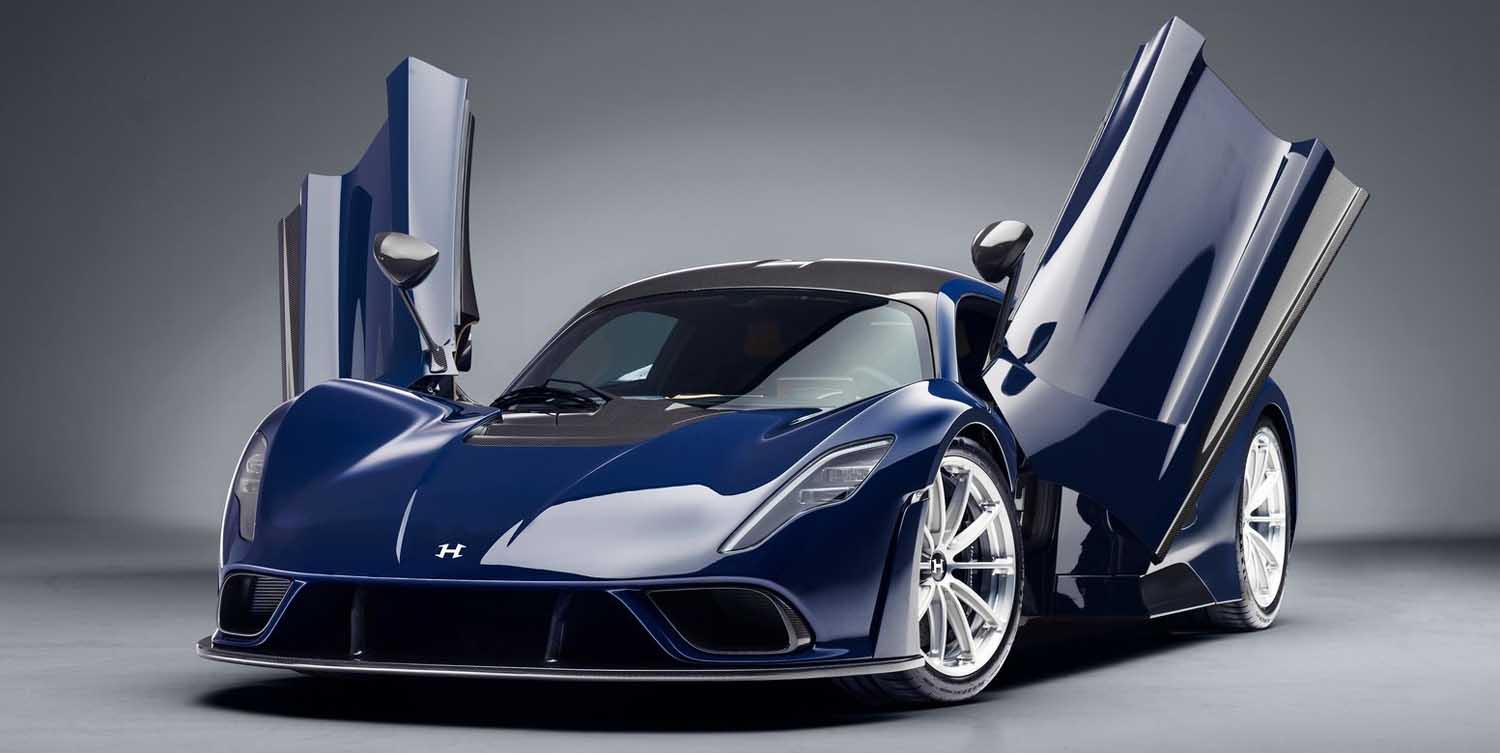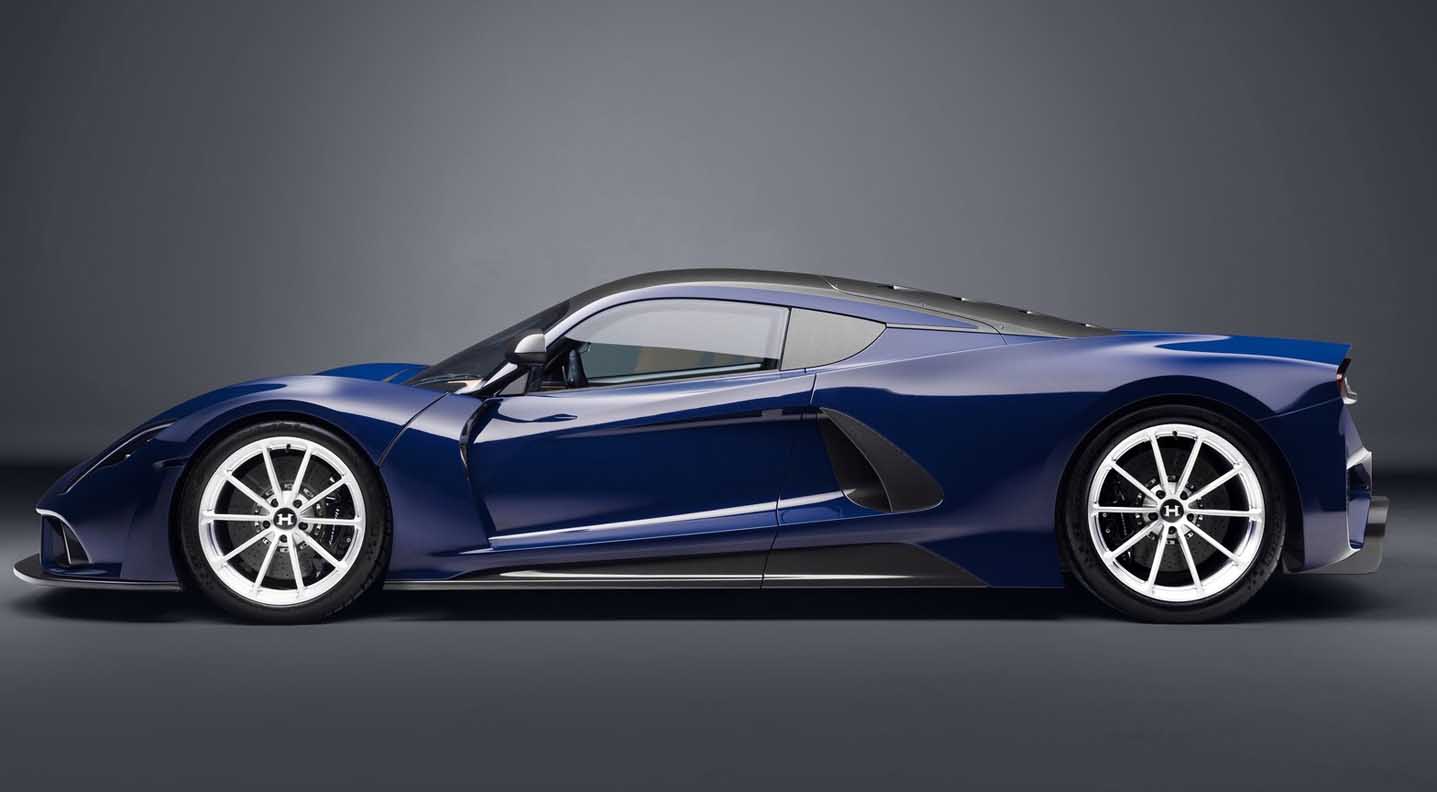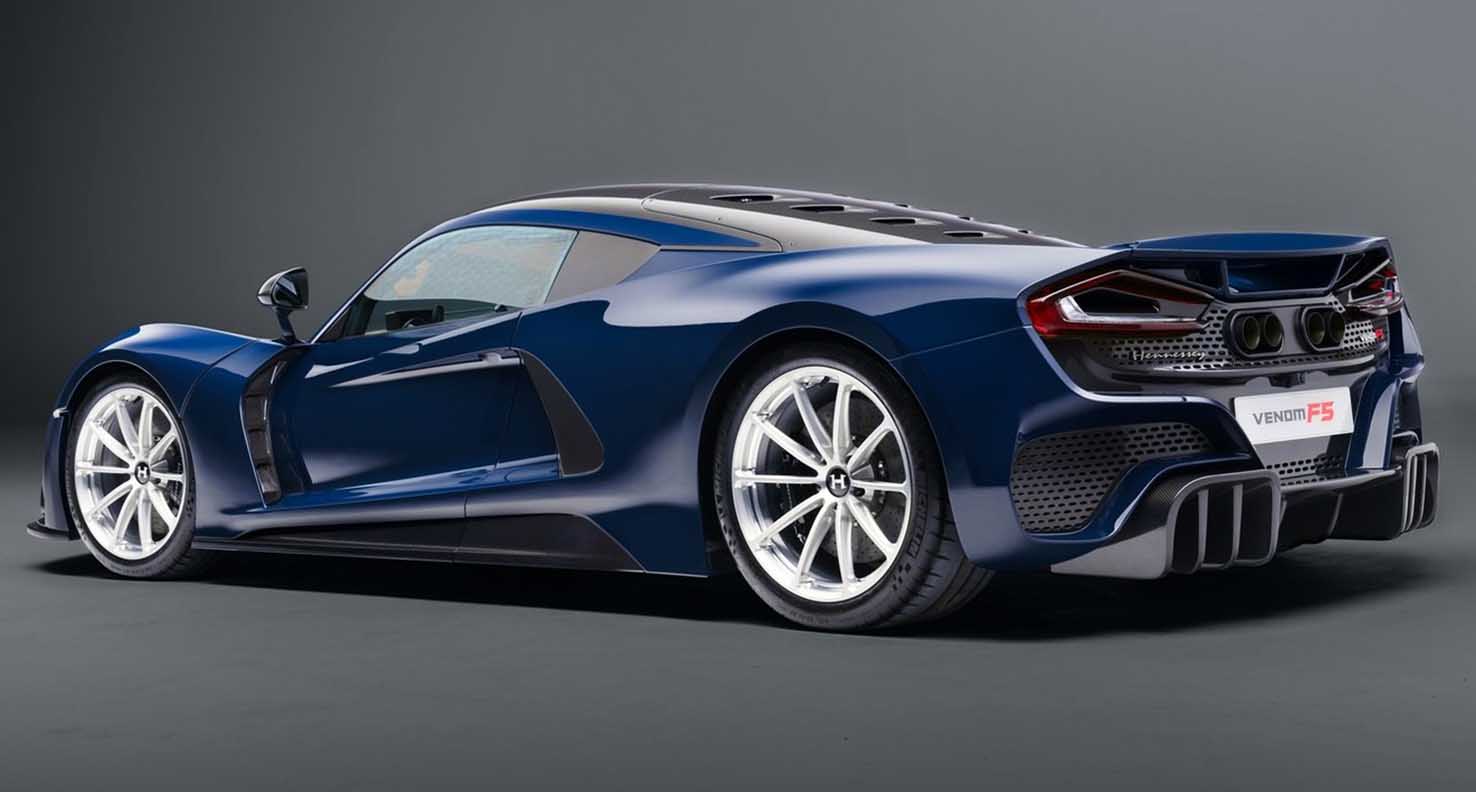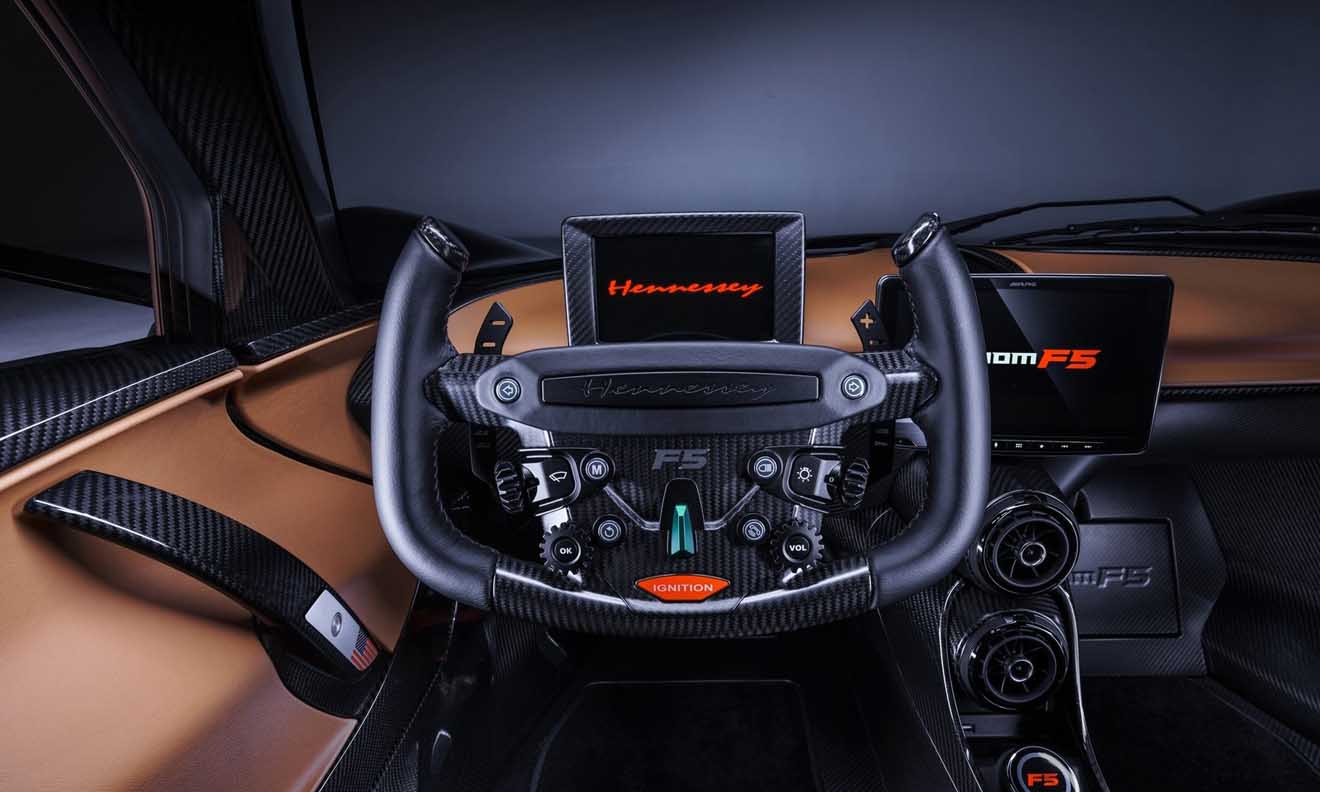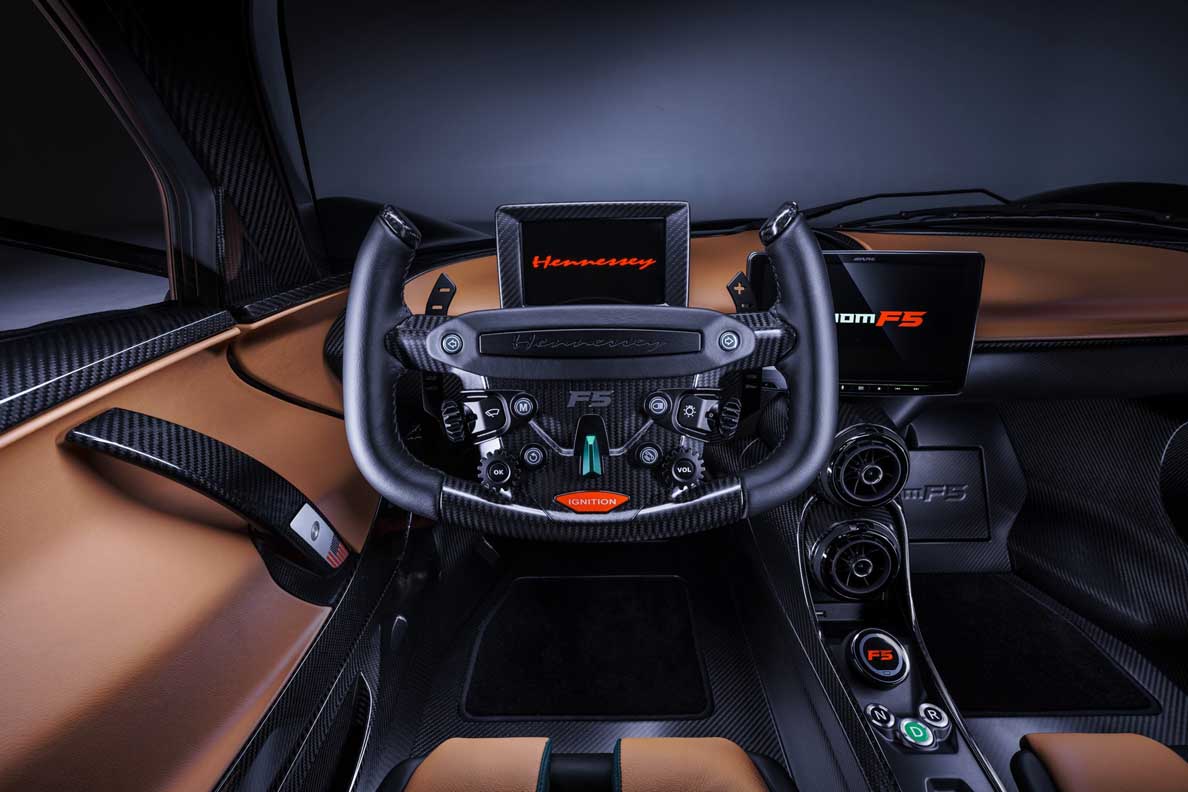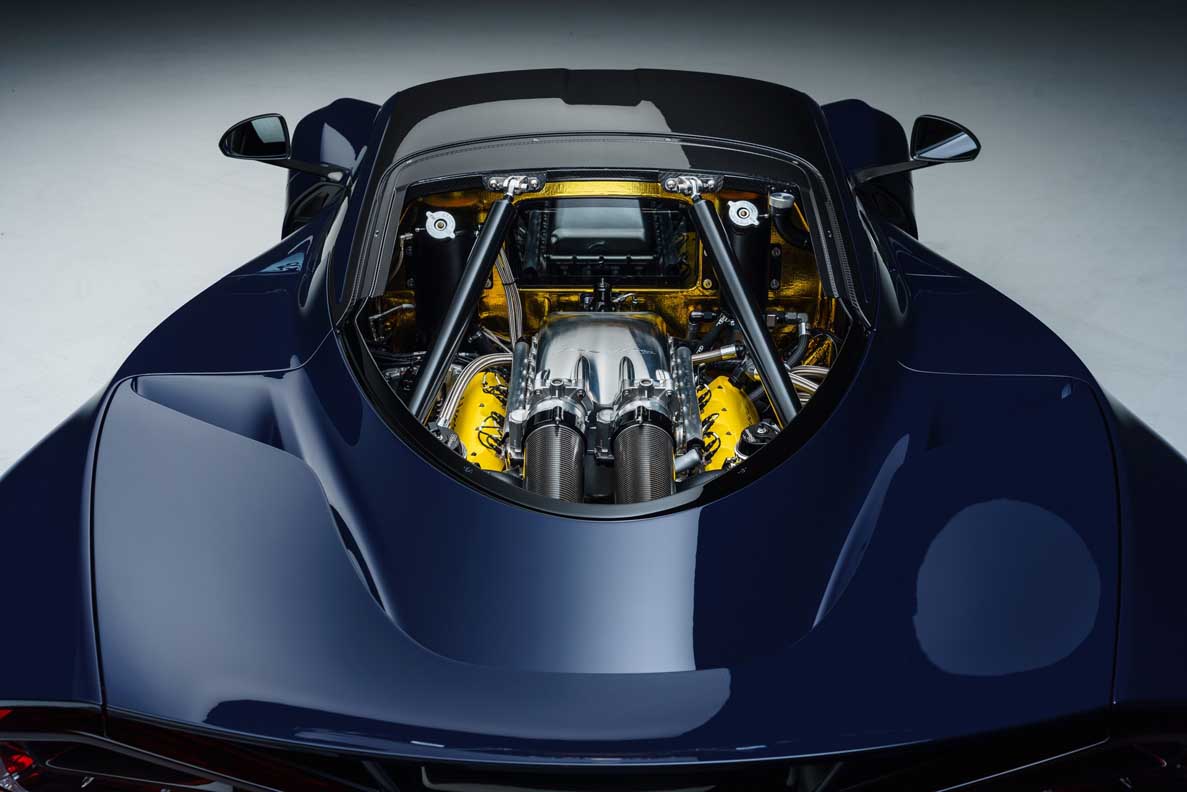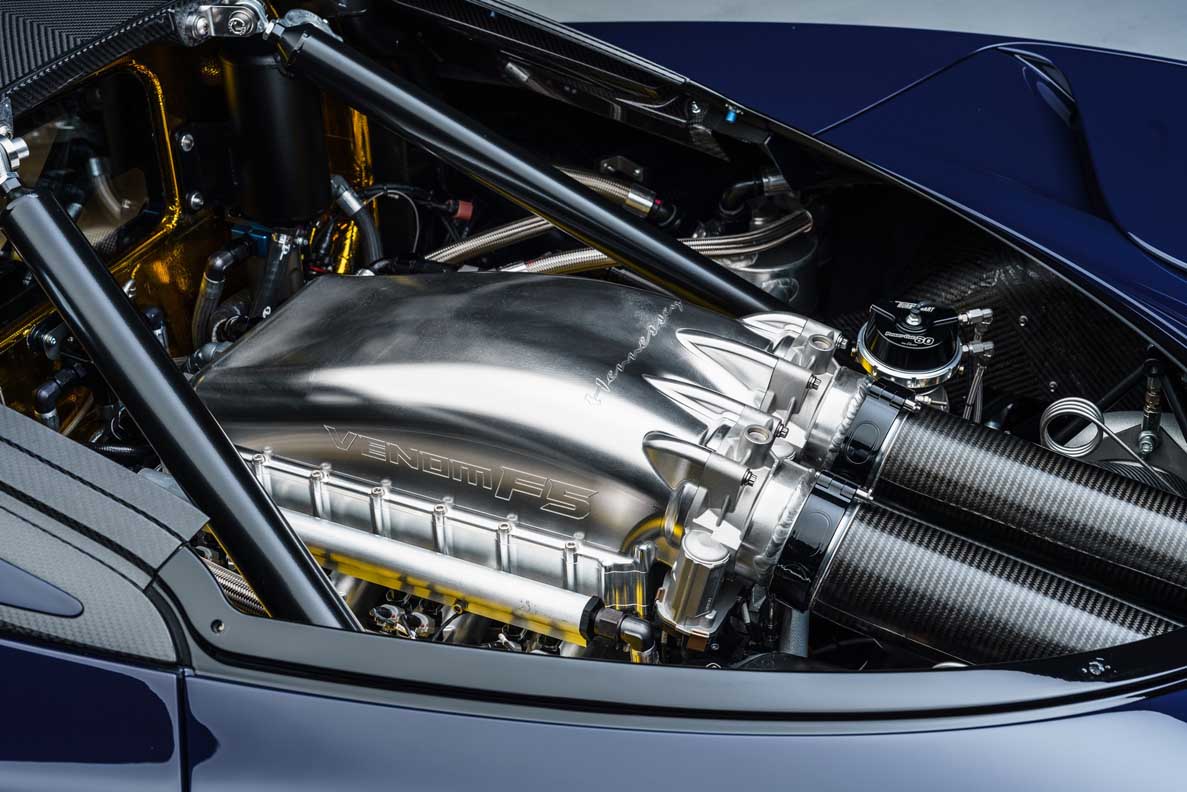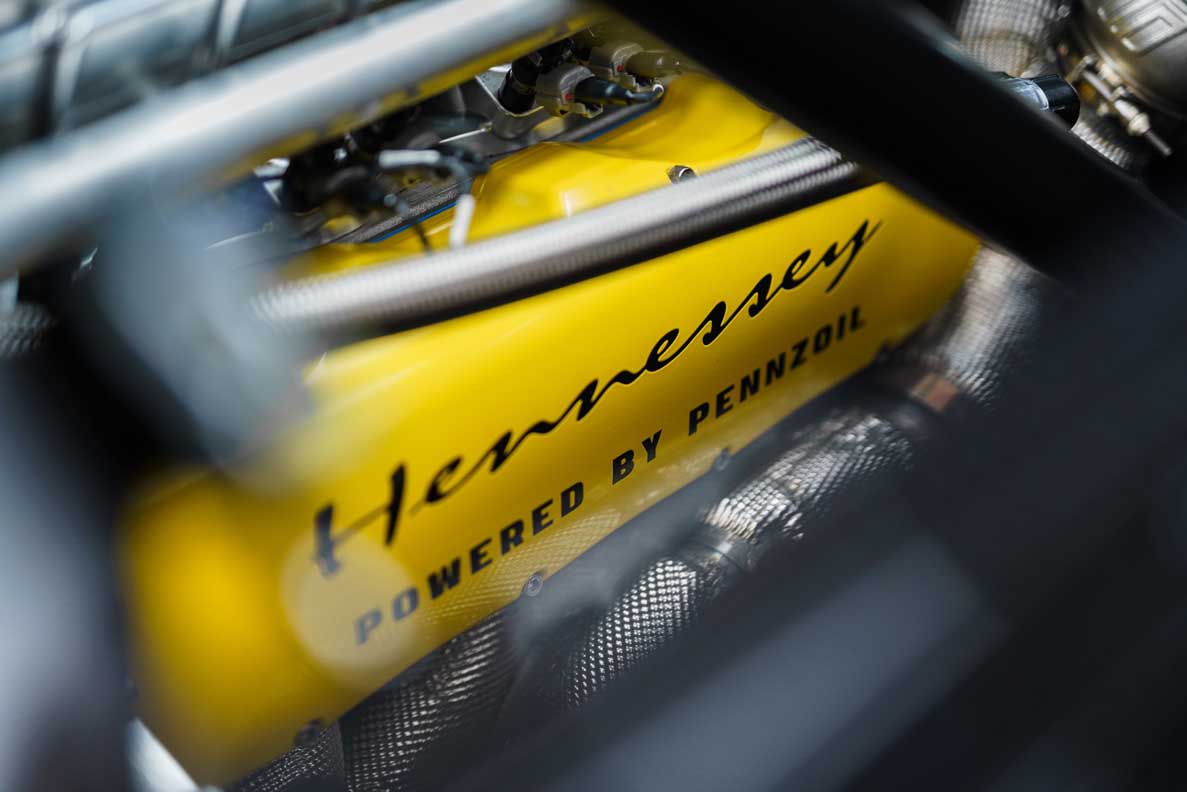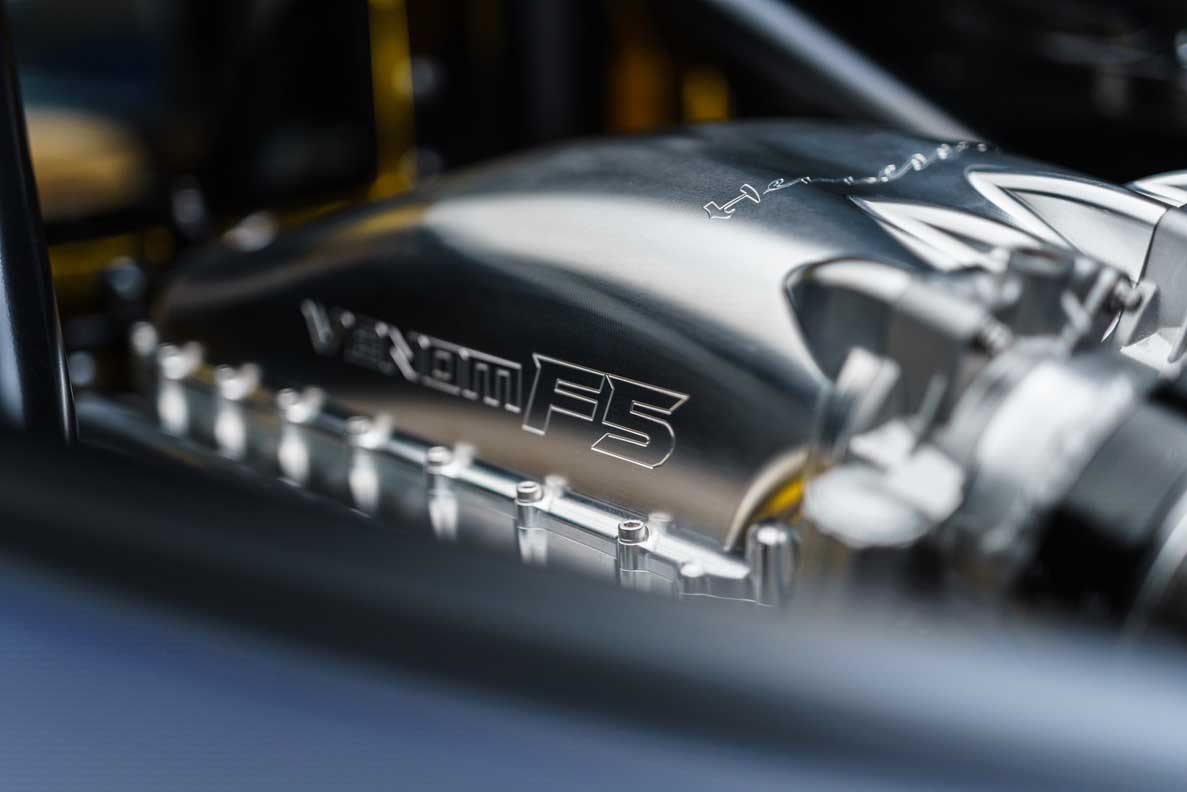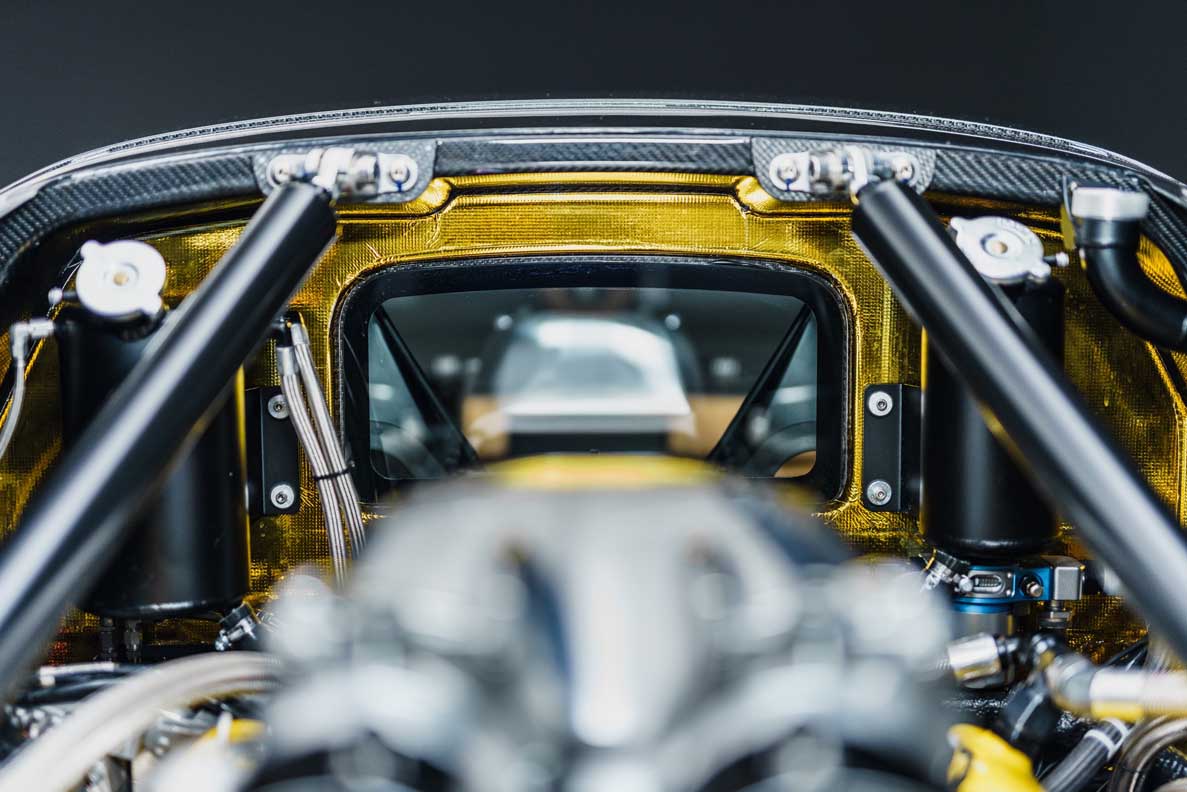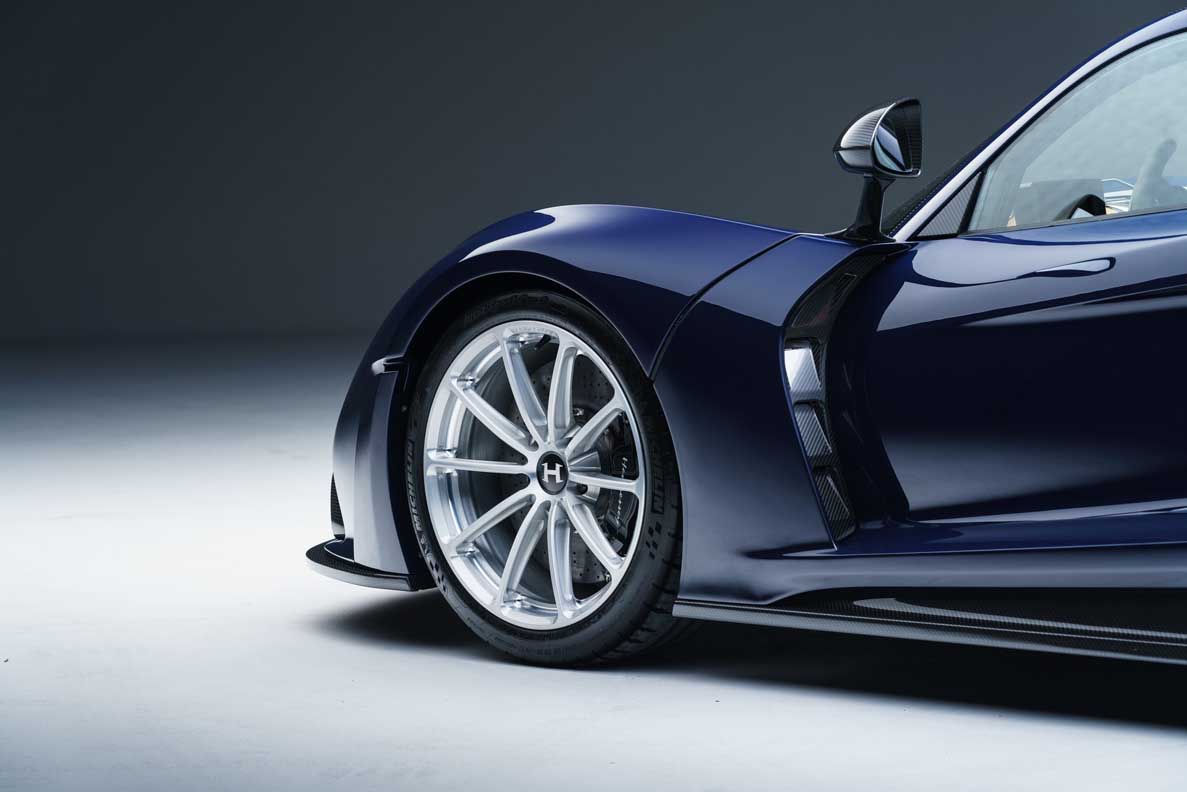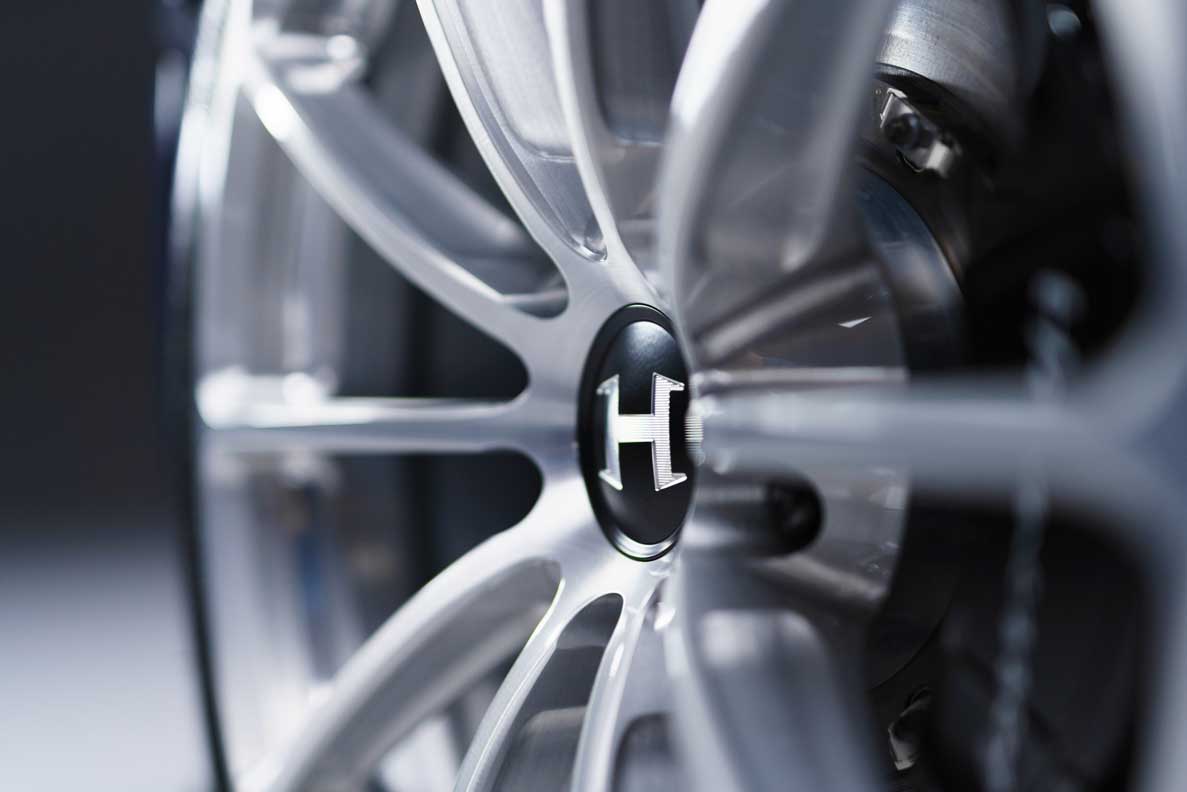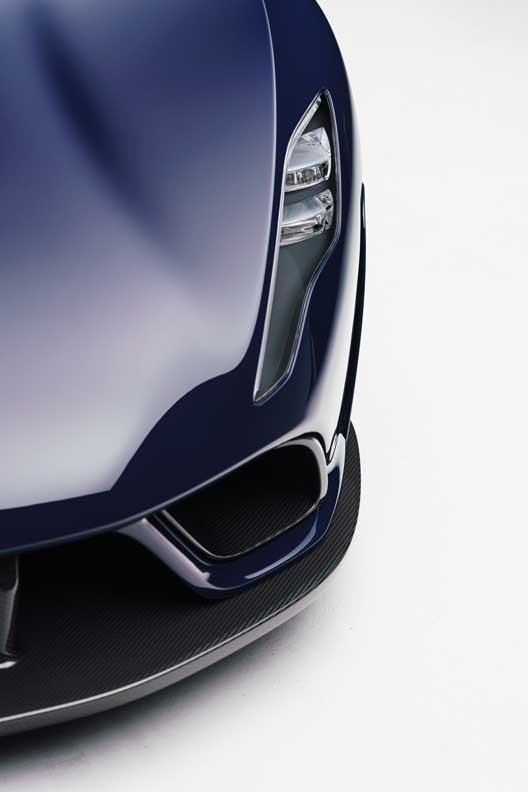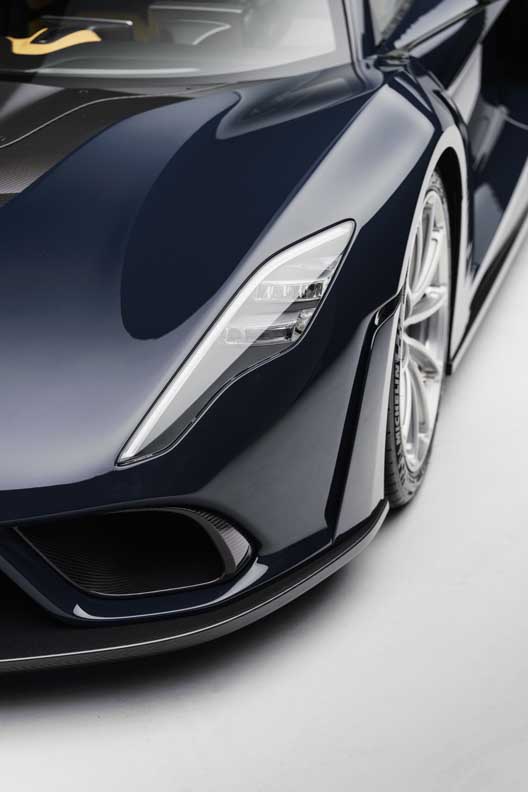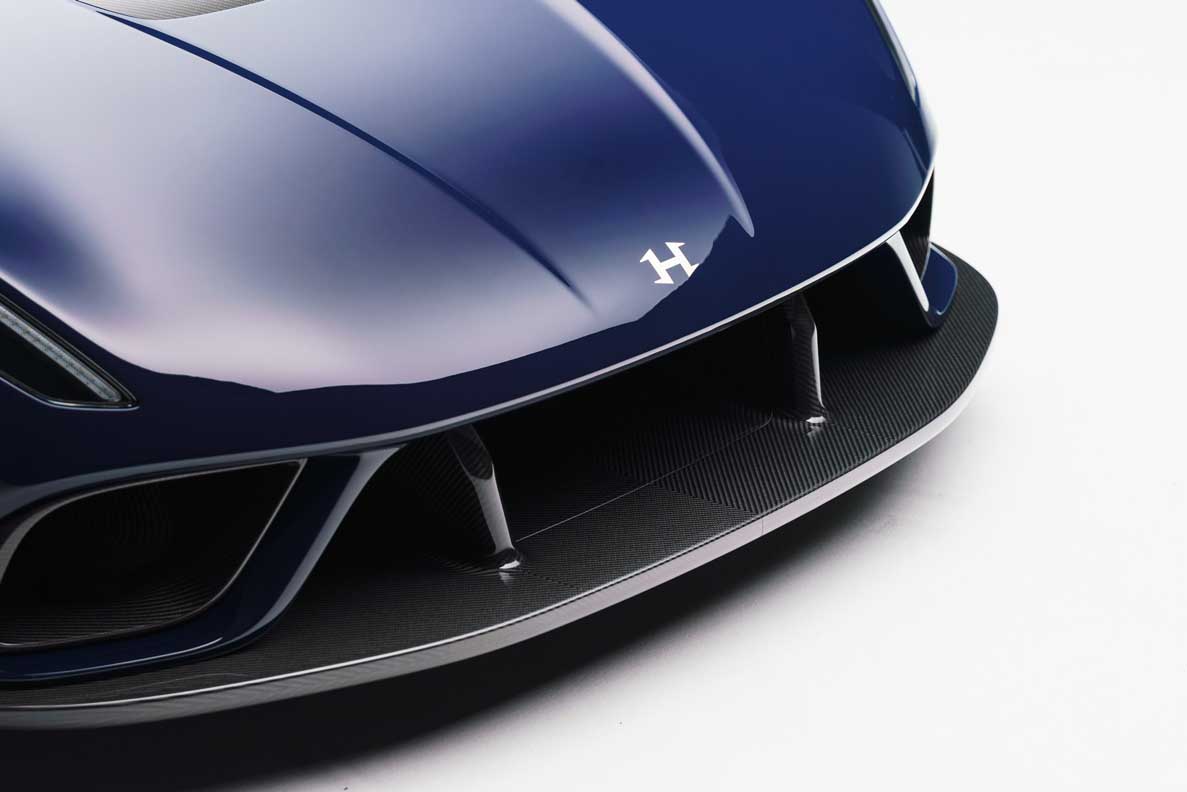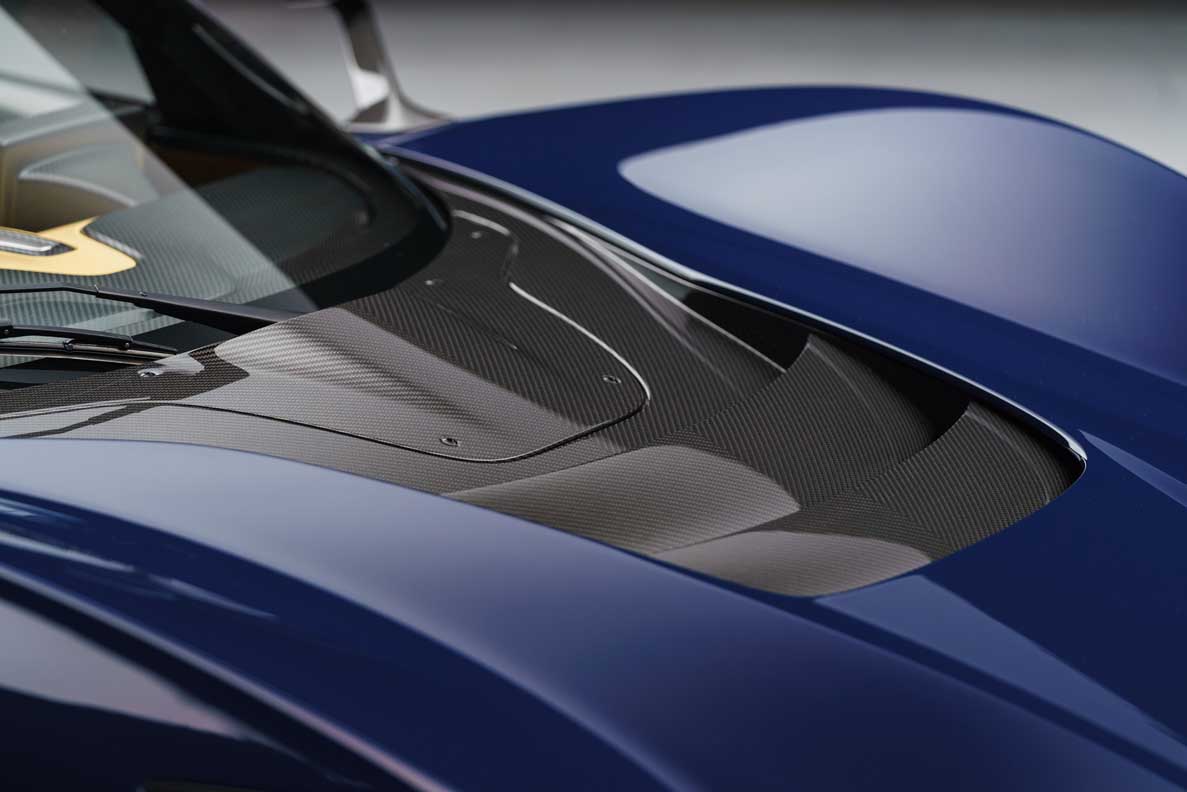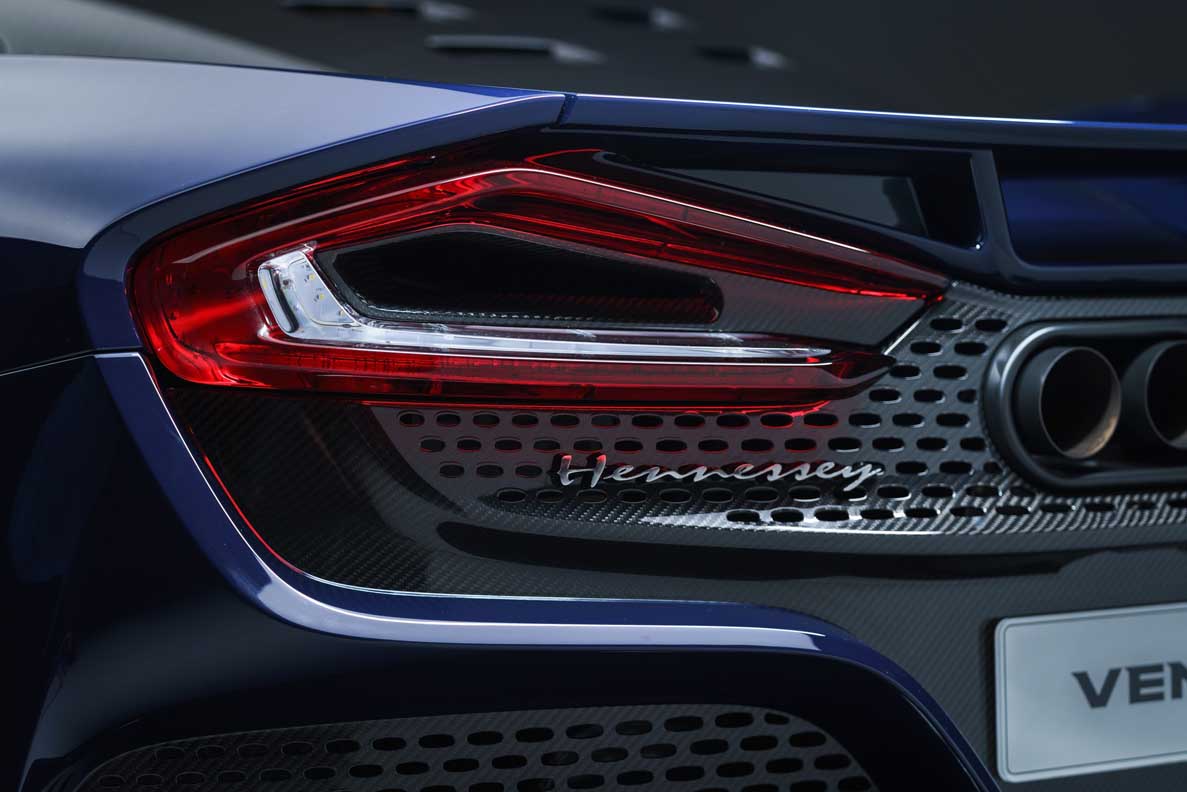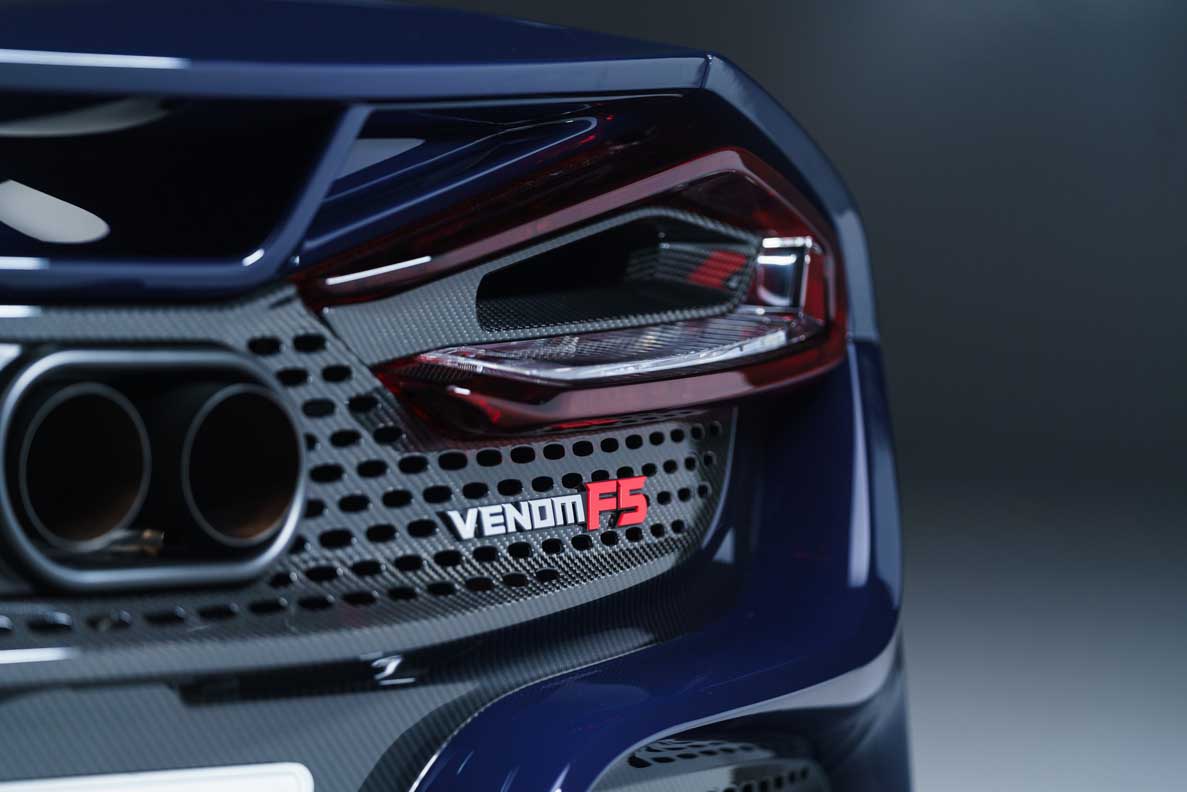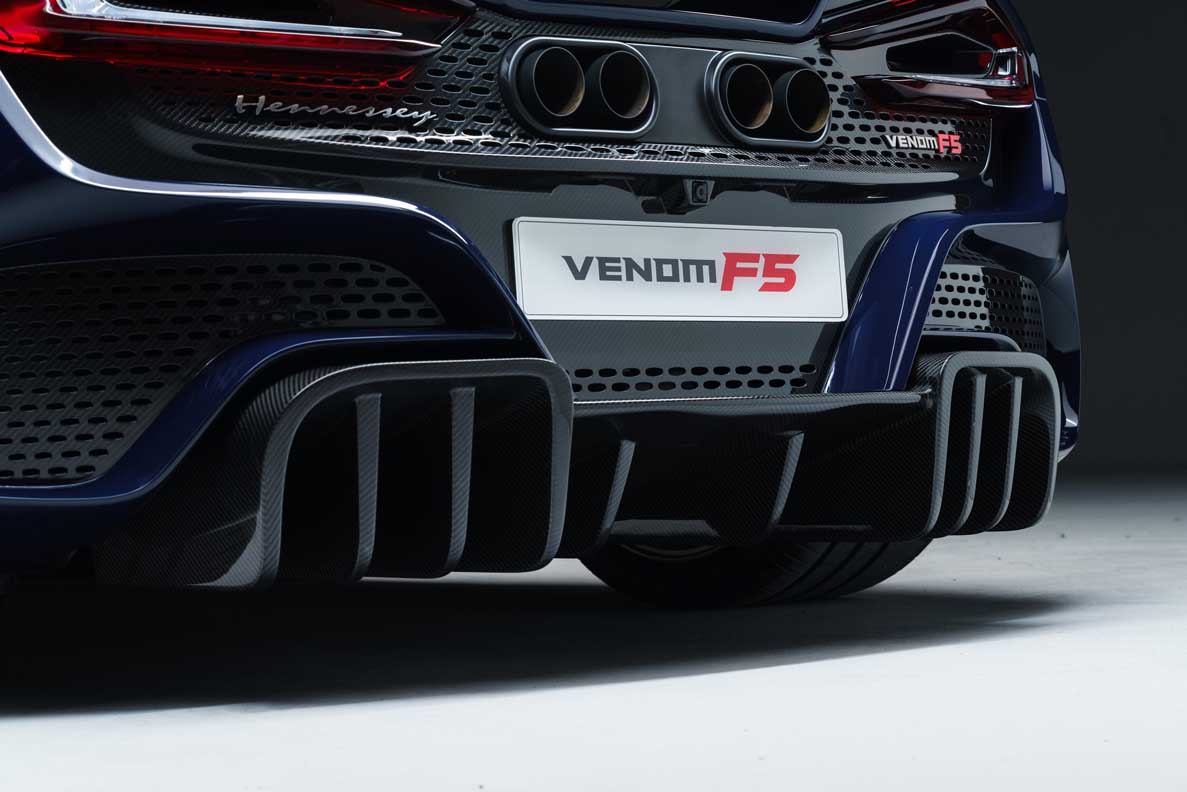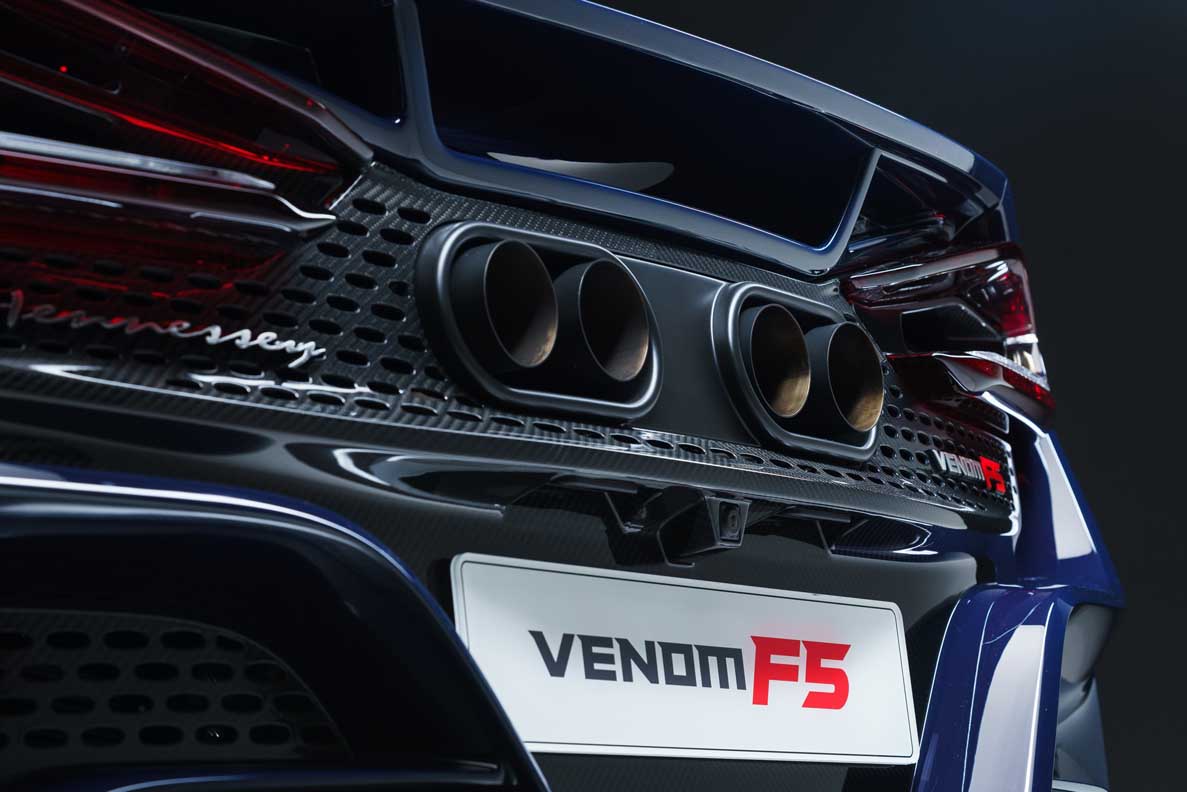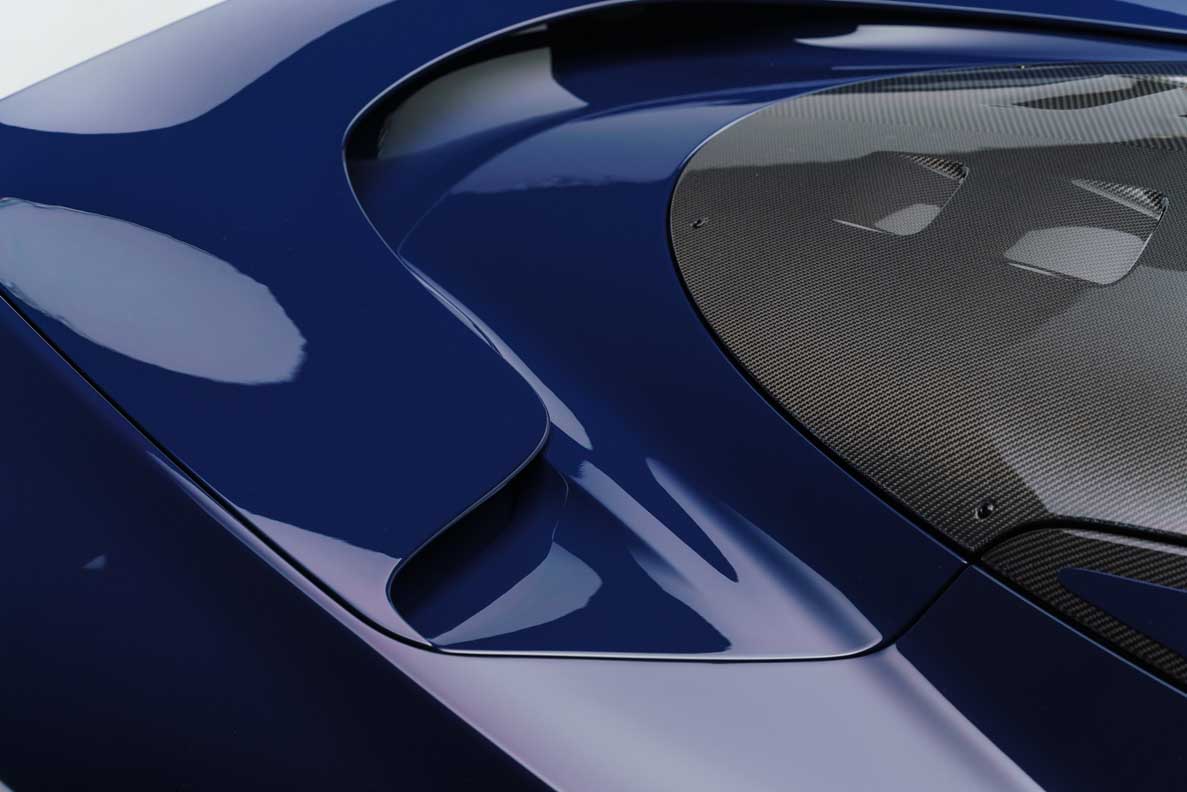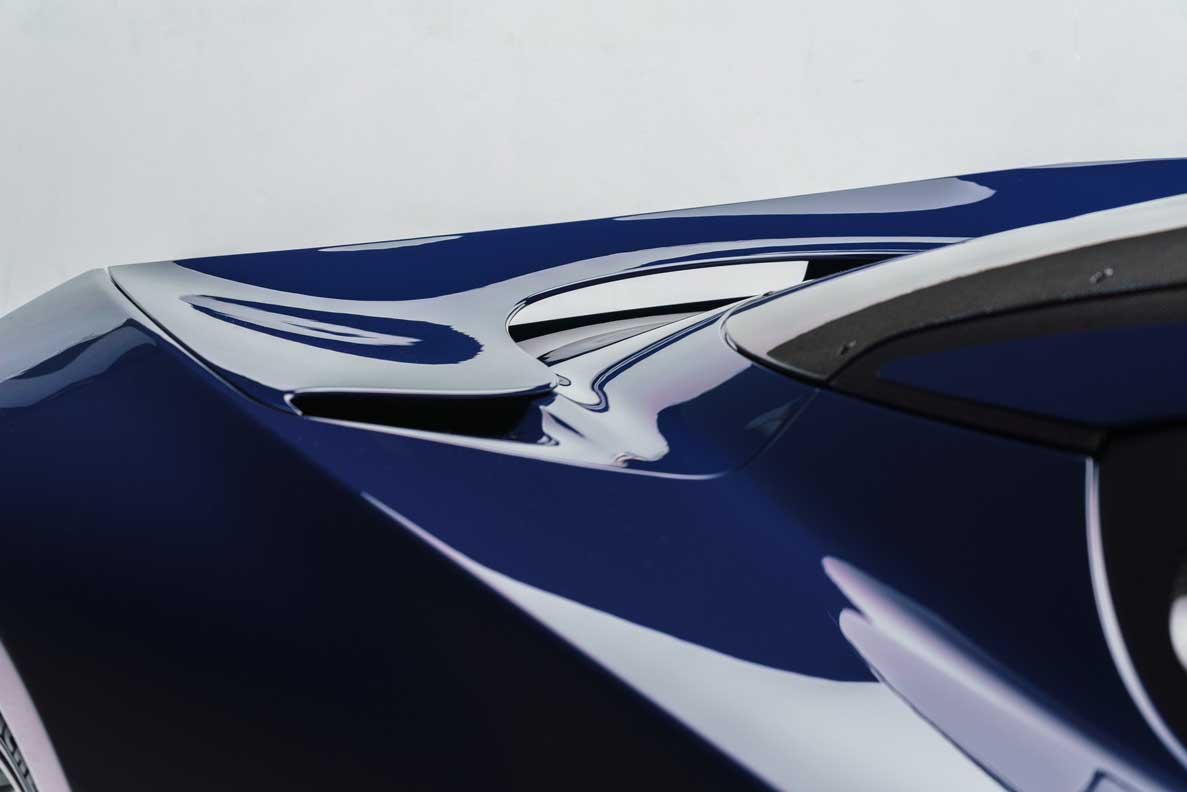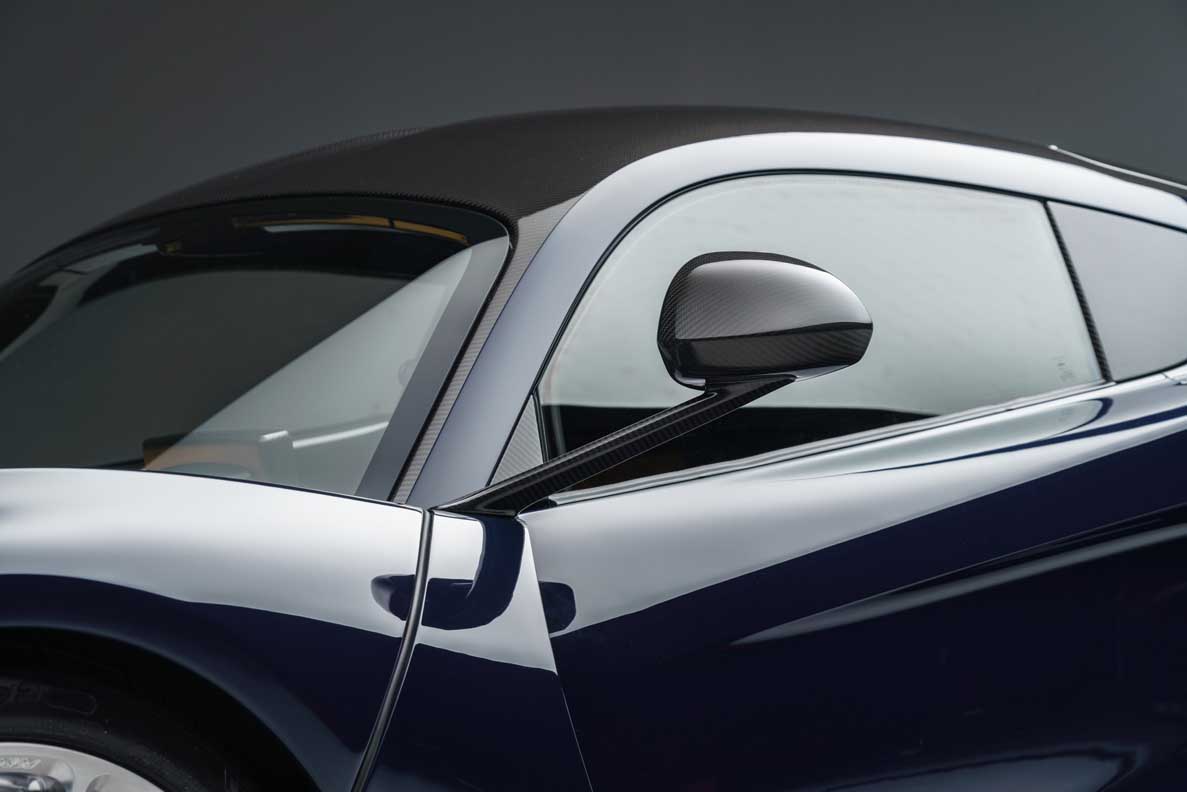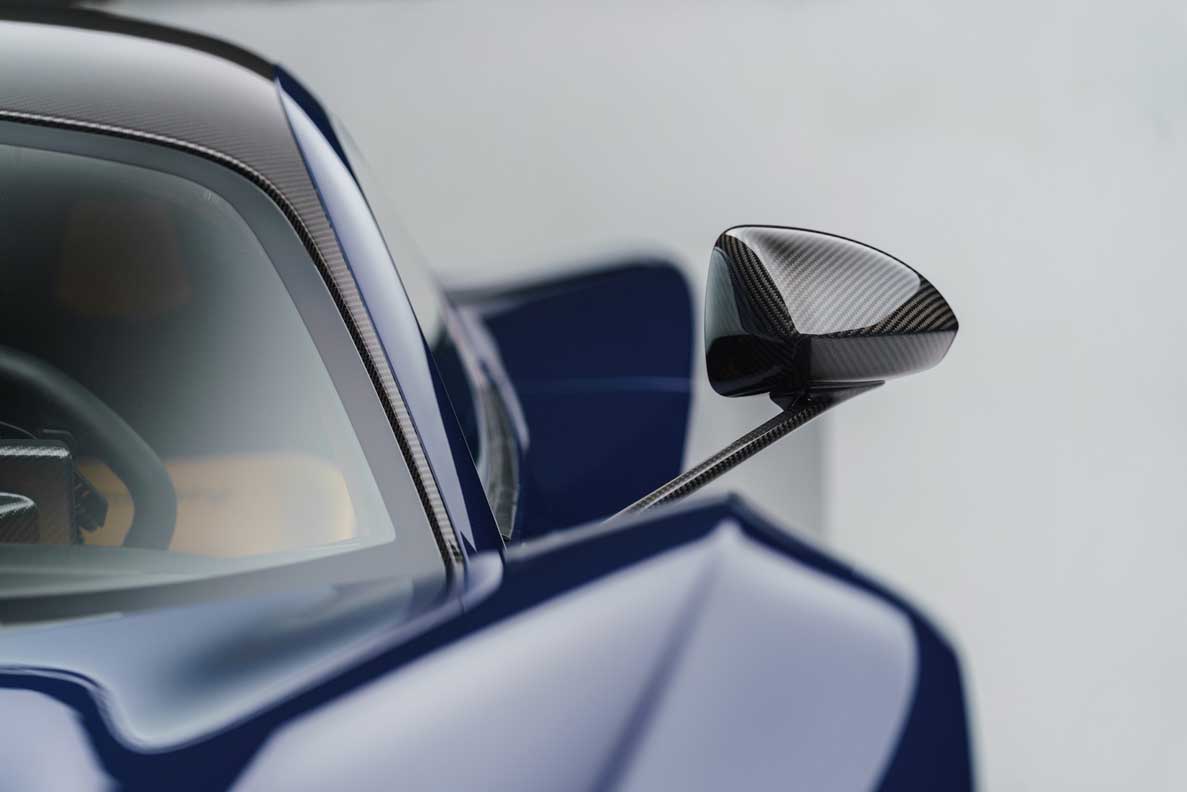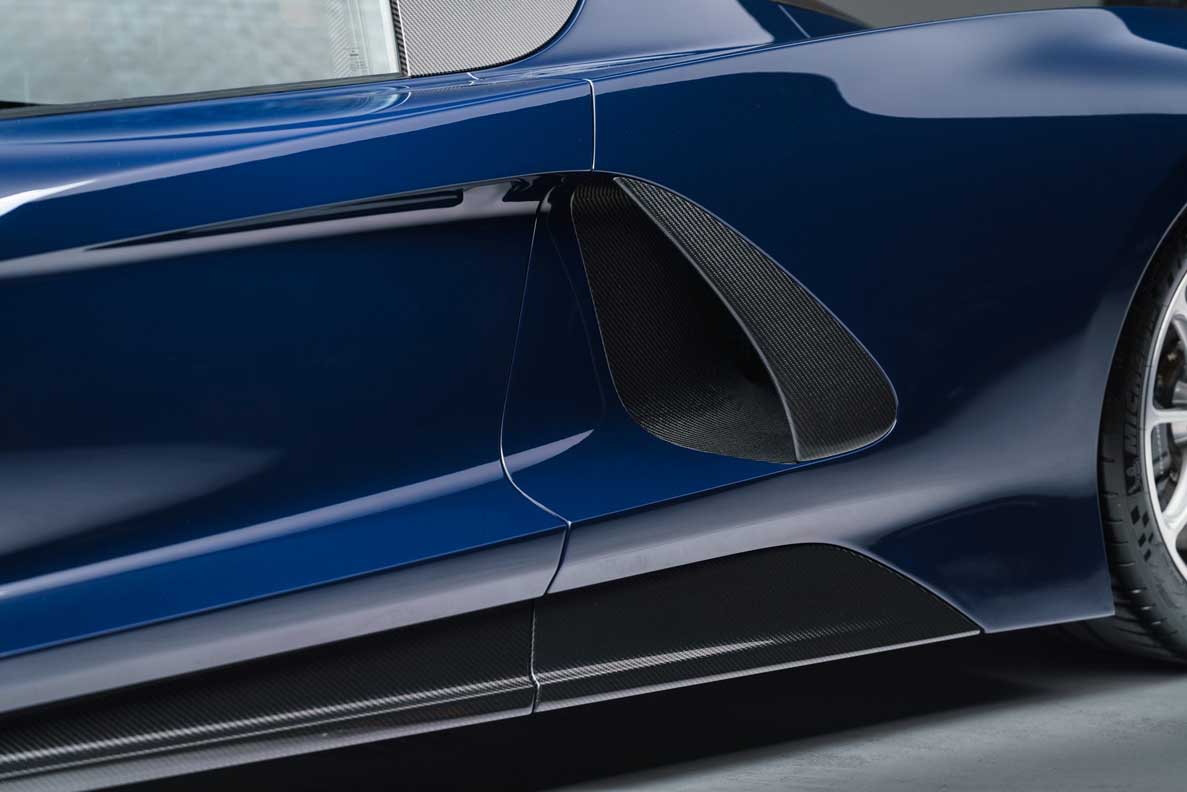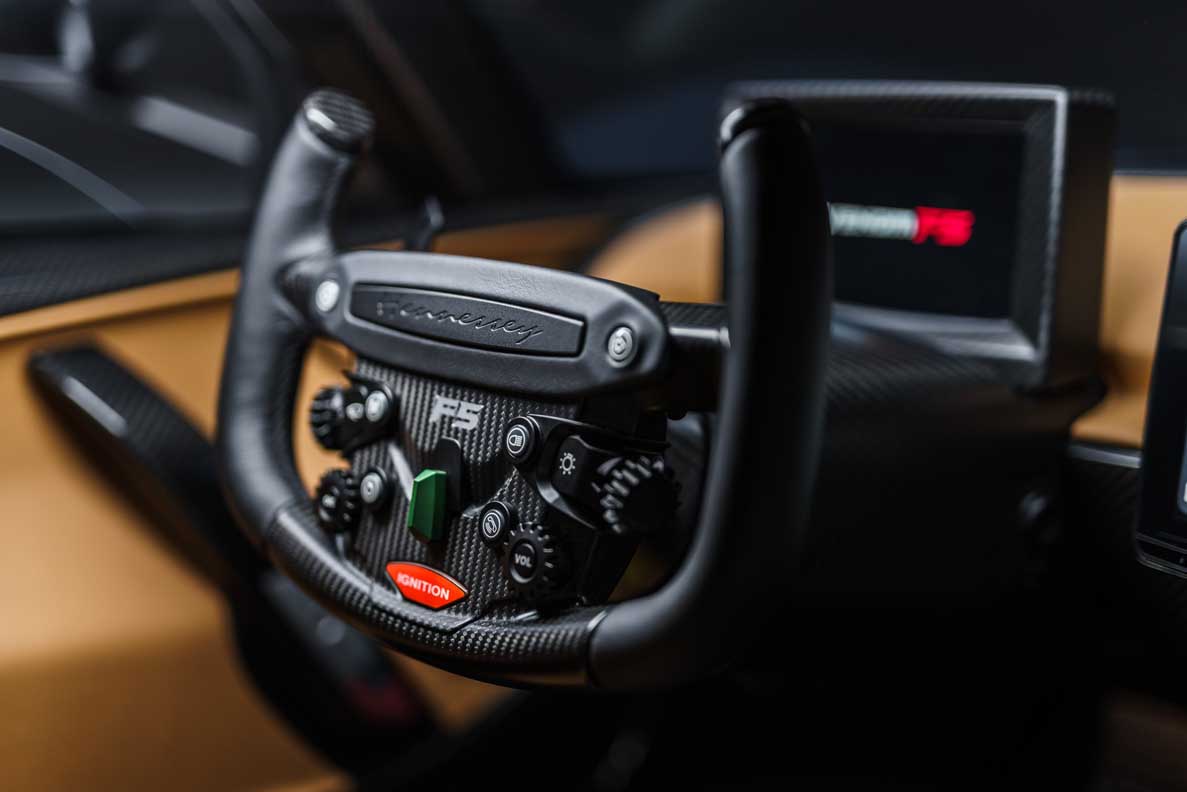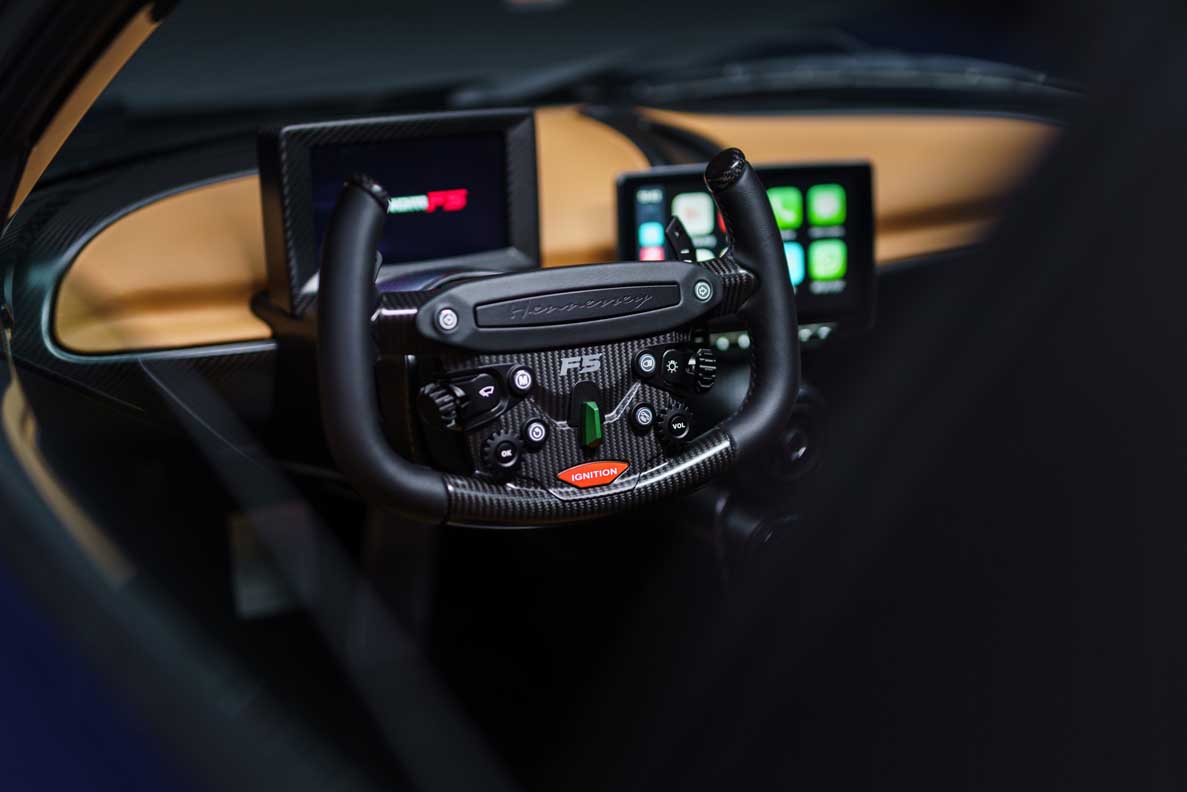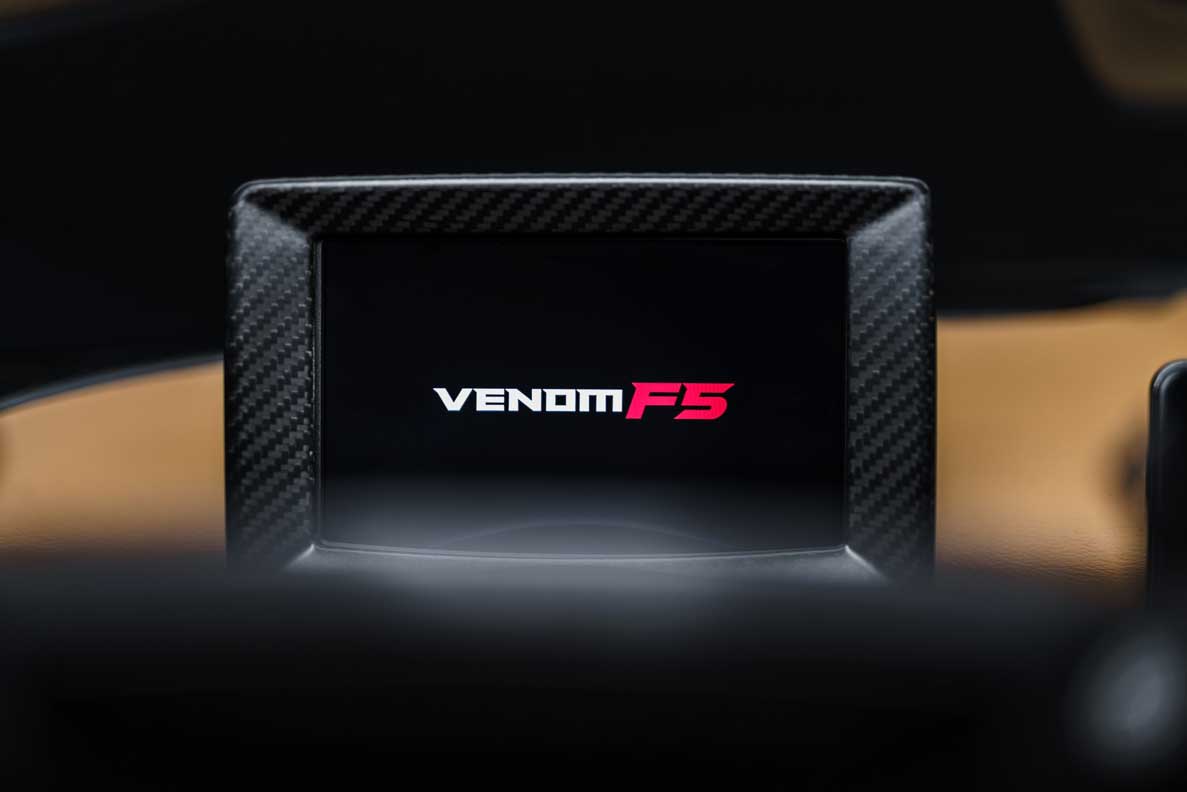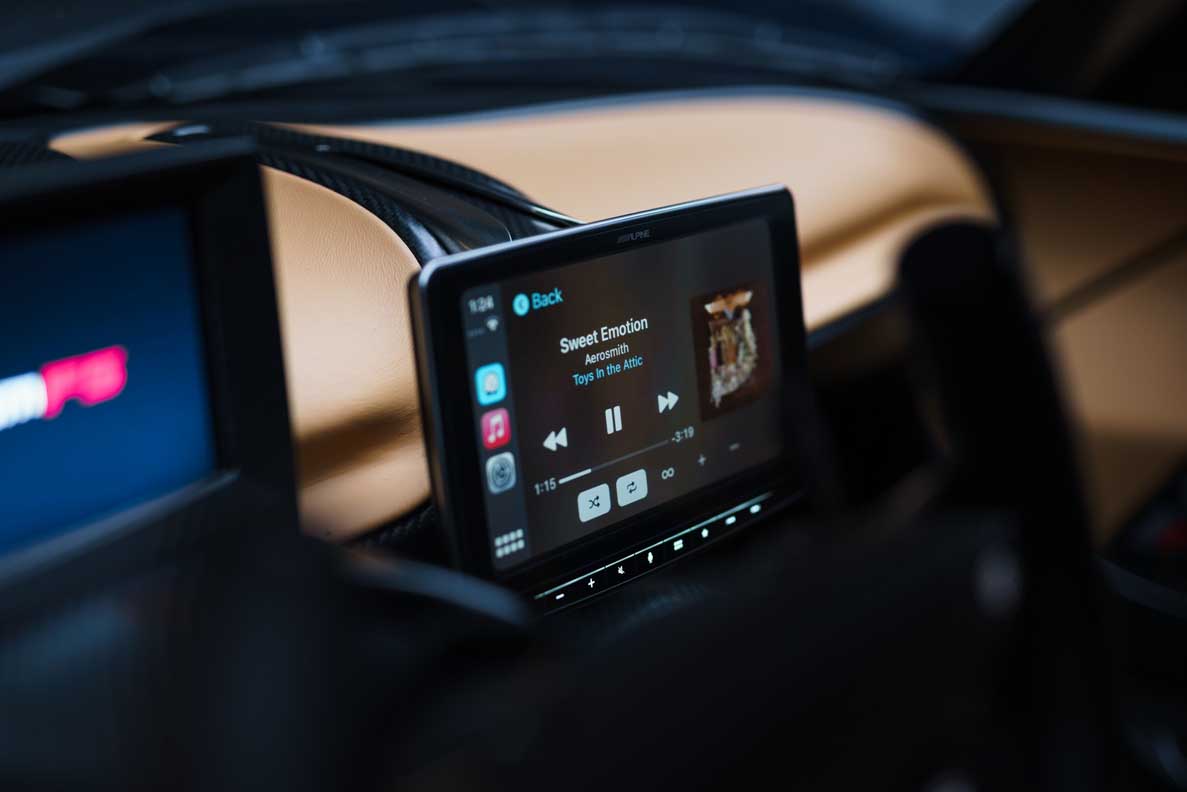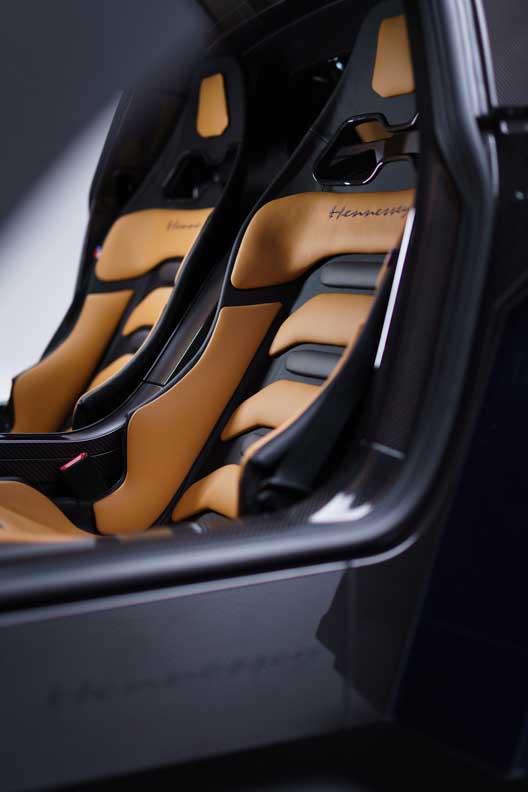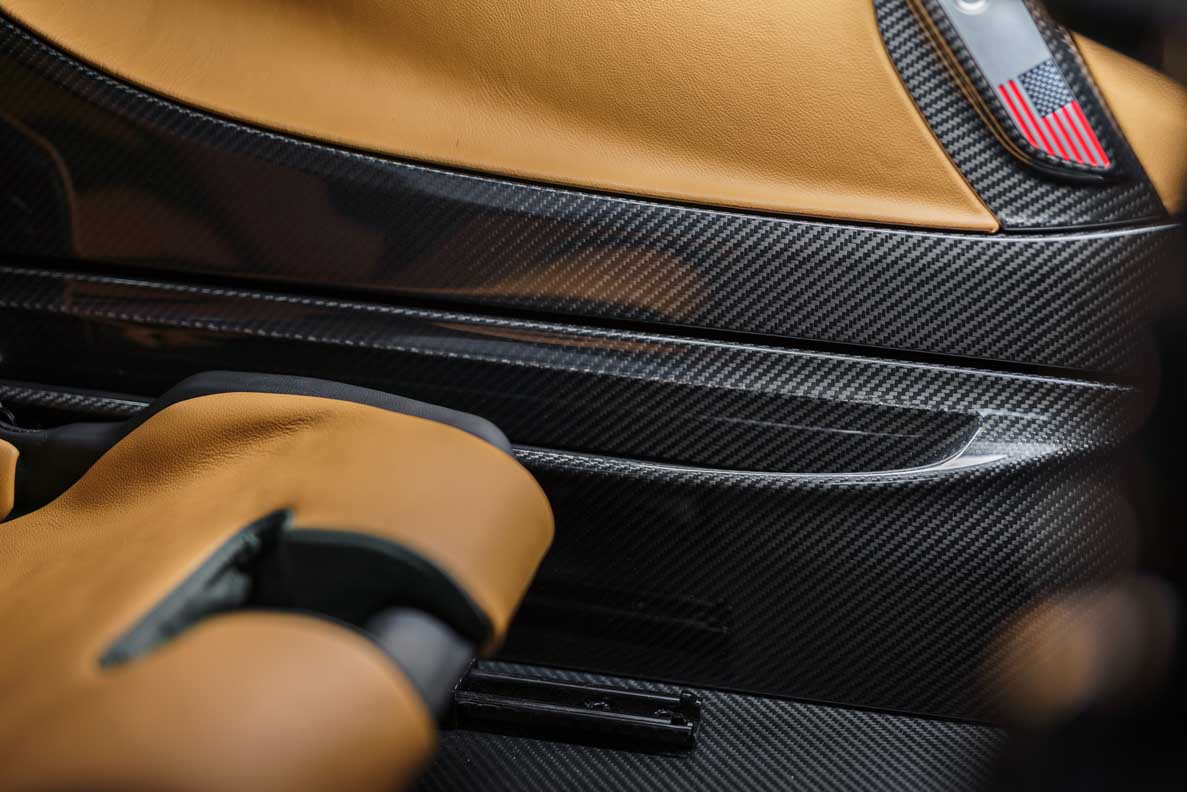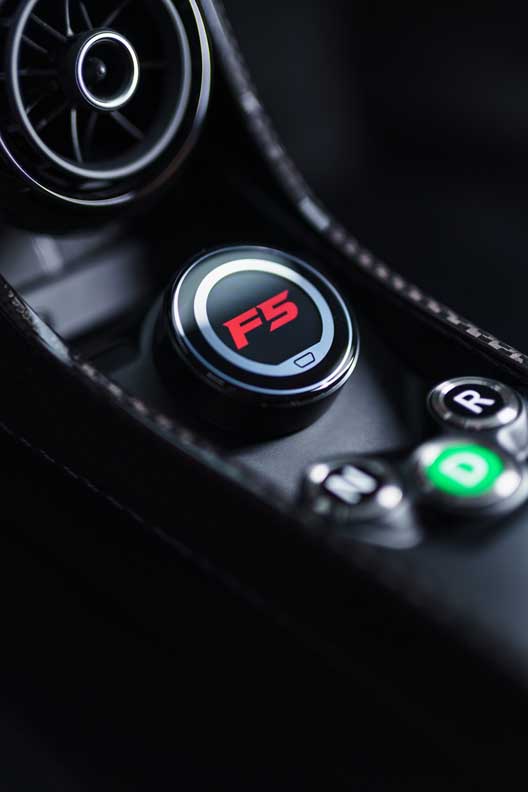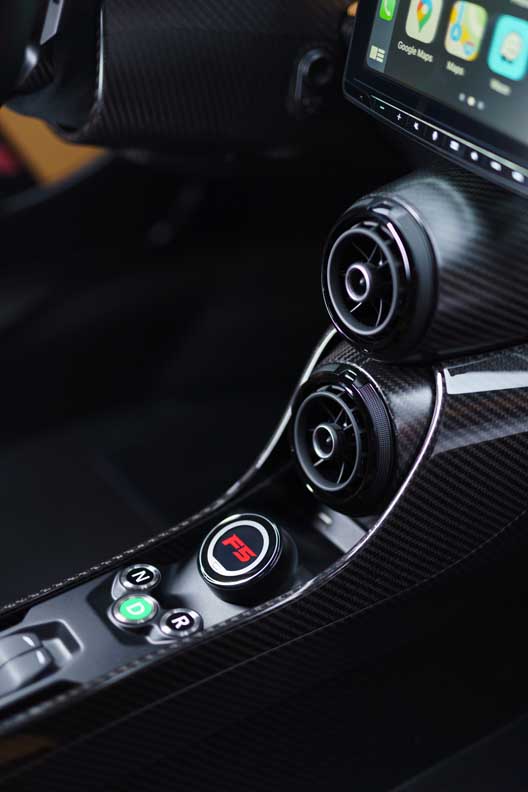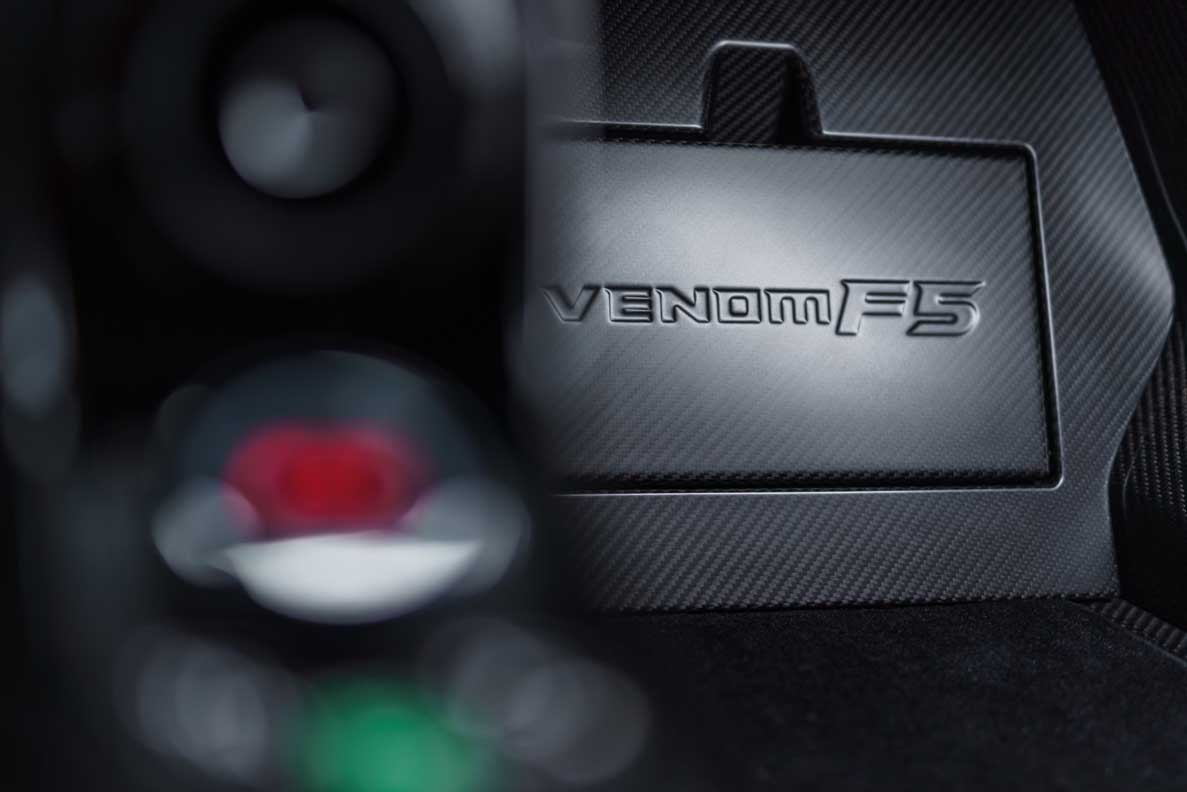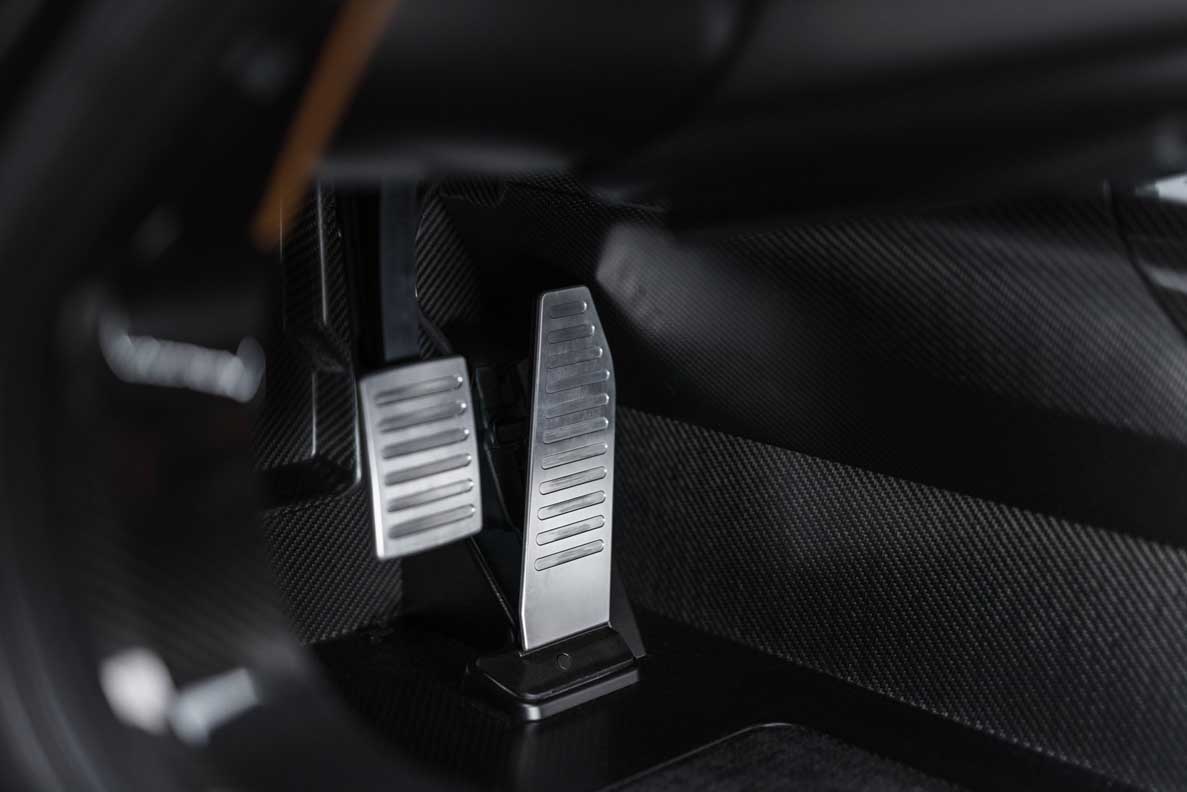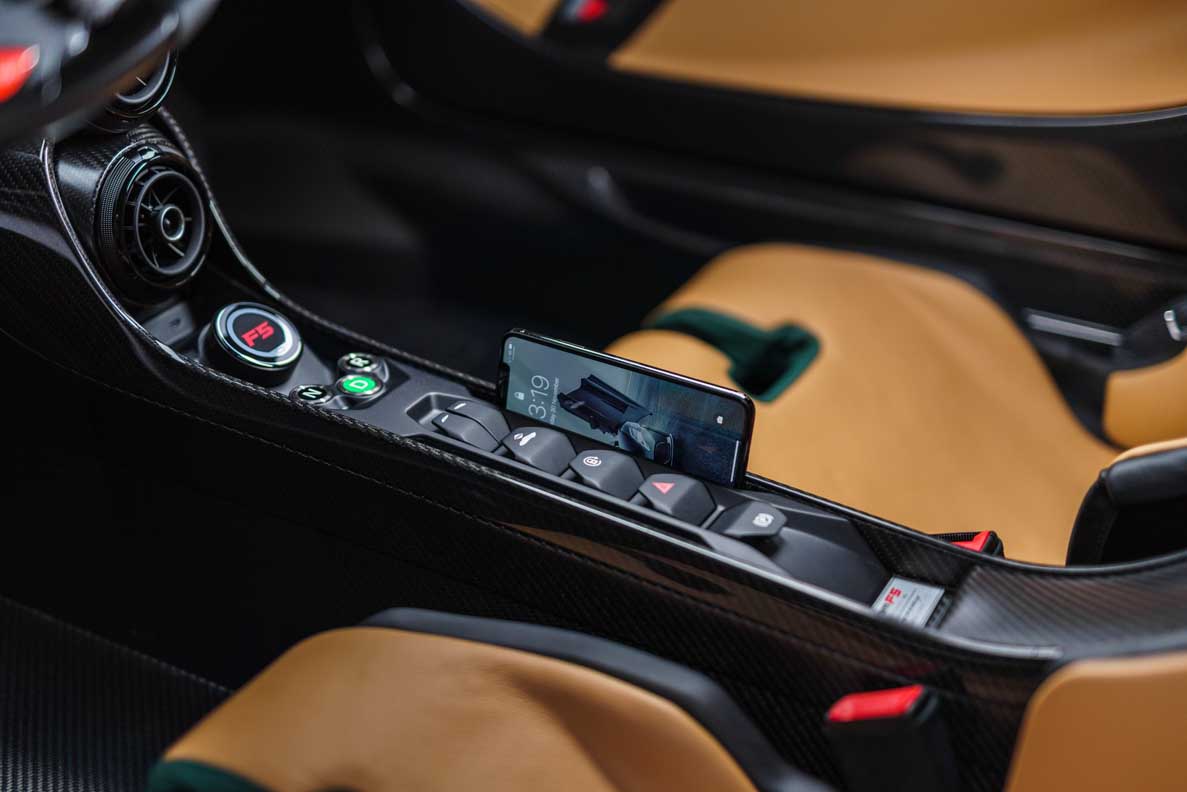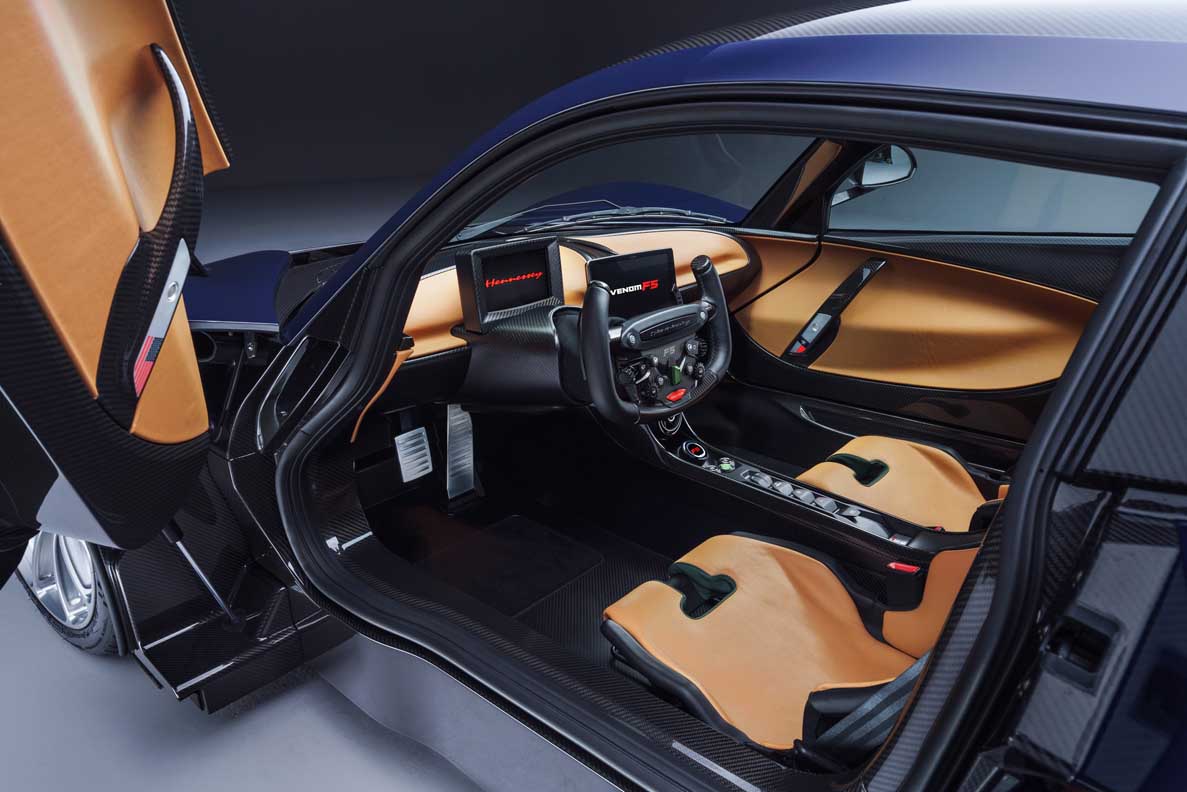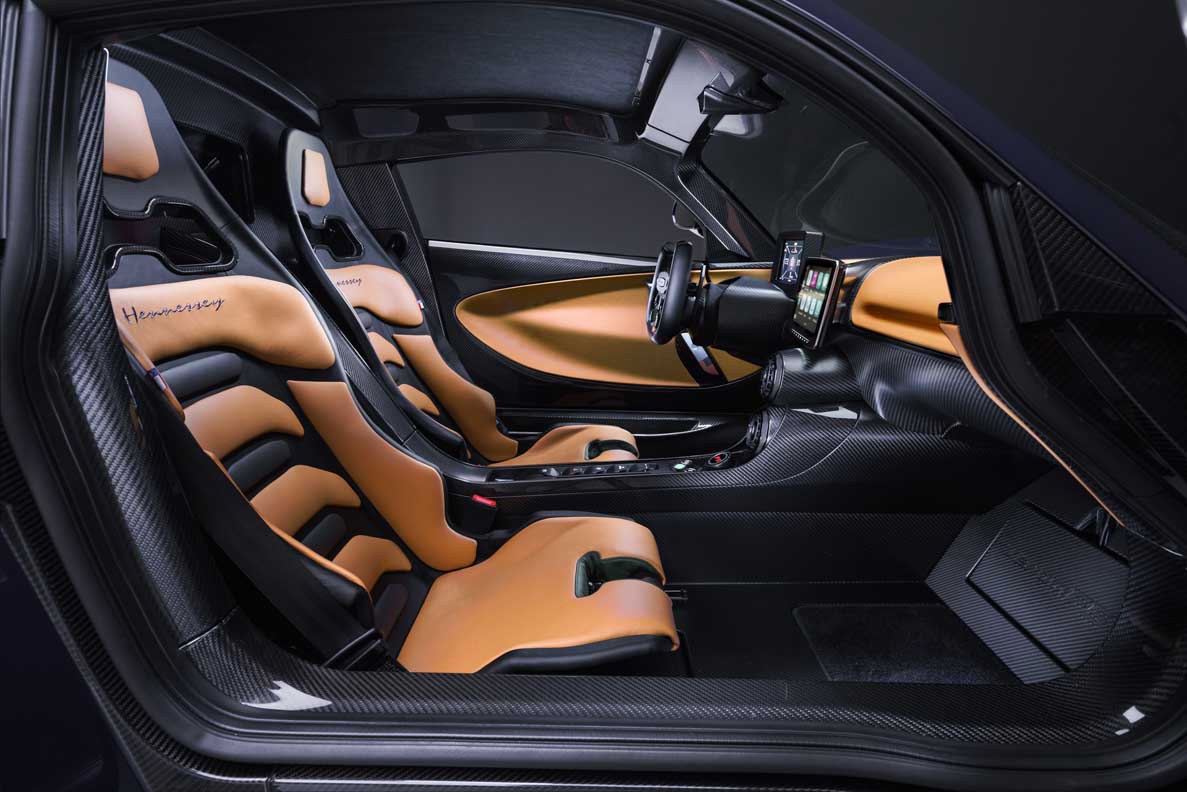
Hennessey Performance has unveiled the production version of its Venom F5 hypercar, ahead of customer deliveries in 2021 – the company’s 30th anniversary year. The all-new 100% bespoke Hennessey Venom F5 is built to deliver the world’s most exhilarating all-round driving experience and unparalleled performance. With its immense power, low weight and meticulously honed dynamics, the F5 boasts extraordinary handling and a truly visceral experience behind the wheel.
Priced at $2.1 million dollars, just 24 ultra-exclusive versions of the Hennessey Venom F5 will be produced with each example unique to its owner. The heart of the car is the Hennessey-built 6.6-litre twin-turbocharged V8 engine named ‘Fury’, which delivers 1,817HP at 8,000rpm and packs 1,617Nm (1,193lb-ft) of torque.
Deploying this unprecedented level of power in a car weighing just 1,360kg (2998lb) results in prodigious acceleration: 0-100kph (62mph) takes less than three seconds and it will smash a 0-200kph (124mph) run in under five seconds. As part of its validation, the F5 is targeting a top speed in excess of 500kph (311mph) and will prove this with a transparent and independently verified top speed run in 2021.
The Venom F5 project is overseen by company Founder and CEO John Hennessey, who has shaped every aspect of the car’s specification, design and development. John has combined knowledge from the company’s past 30 years of making fast cars faster with the highest levels of specialist engineering talent.
John Hennessey: “Our customers love speed, so we’re fired-up to push the boundaries of what’s possible to attempt the world’s fastest production car record, but the Venom F5 is about more than just speed and power. This car will handle superbly, quality is exceptional, there are more than 3,000 bespoke parts, materials are exquisite, everything is a fitting tribute to 30 years of the Hennessey brand.”
The Hennessey Venom F5 is a symphony of mind-bending numbers, but that’s not the whole story. The car’s dynamics have been developed by Hennessey’s in-house dynamics guru – legendary US racing driver and vehicle set-up expert John ‘Heinrocket’ Heinricy. During the car’s development, his input will ensure that F5 offers a world-class all-round driving experience on road and track.
The F5’s status among the world’s greatest hypercars goes far beyond its world-leading performance figures. Its design, ultra-lightweight carbon fiber monocoque, premium quality and bespoke construction all place it at the pinnacle of global hypercars.
Underscoring this position at the peak of hypercar performance, the F5 will complete top speed testing in the first half of 2021 at the NASA Shuttle Landing Facility in Florida. Subsequent top speed run will follow an intense period of real-world development at Hennessey’s own testing facility, plus the Circuit of The Americas – with John Heinricy leading the development team and conducting the bulk of hands-on testing.
The F5 aims to exceed 500kph (311mph) on a two-way validated speed run using a production specification car. The record attempt will be independently verified by the world-renowned experts from Racelogic using VBOX GPS data acquisition systems. Racelogic / VBOX engineers will be on site to install, test and calibrate the speed testing equipment in the F5 to ensure absolute accuracy and transparency. In addition, VBOX engineers will verify all test data and final speed numbers. The speed test will be attended by independent witnesses, media guests and F5 customers. GPS data and uninterrupted video footage will also be made publicly available following the speed test.
Distilling 30 years of expertise, knowledge, and world-class engineering, the F5 is seen as the culmination of the Hennessey brand’s innovation and success. Additionally, it serves as a launch-pad for the next 30 years and is a significant leap forward for the company. The F5 marks the beginning of a new era of Hennessey vehicles designed to delight the driver and celebrate performance engineering.
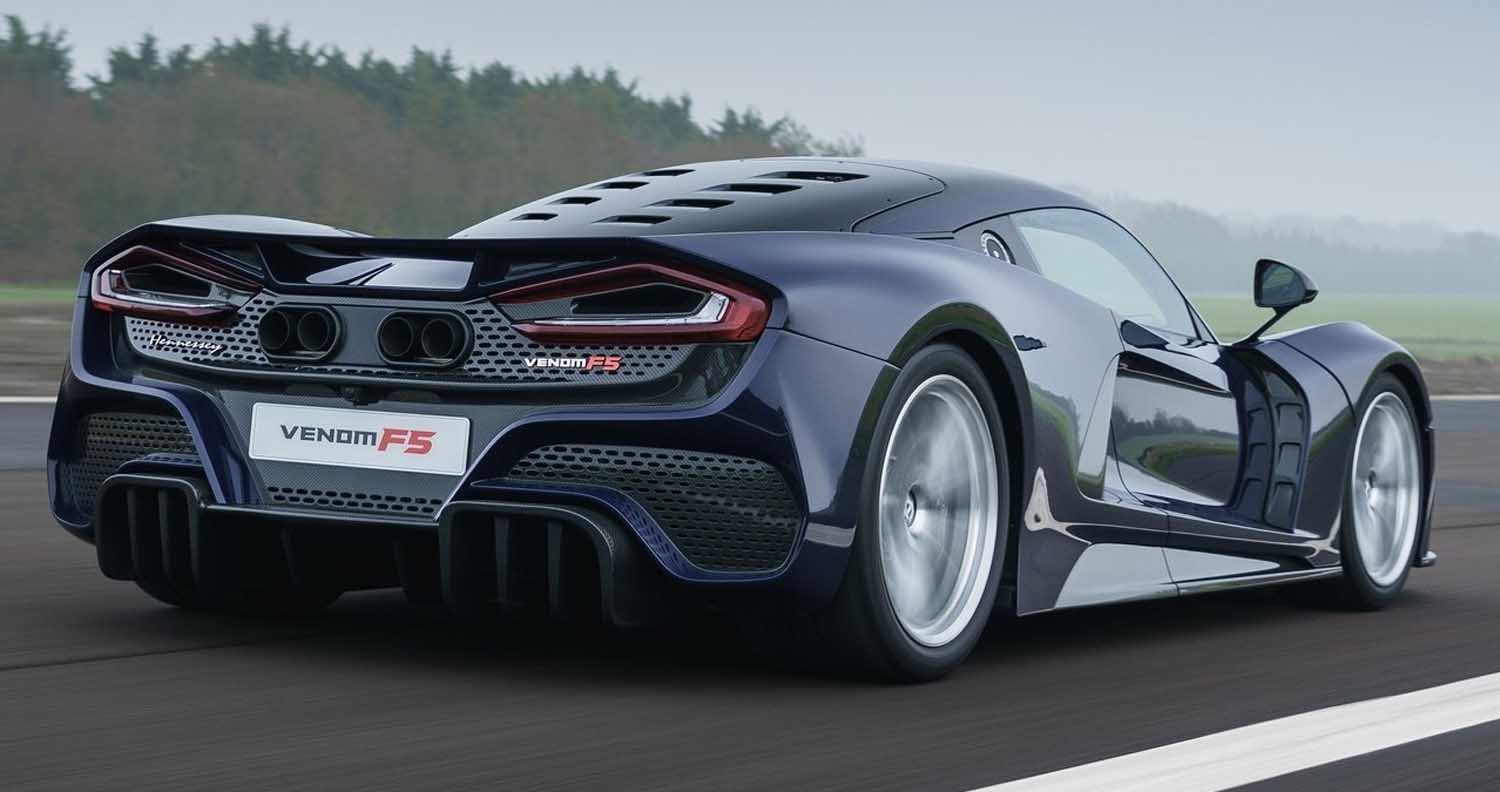
Vehicle dynamics – fully-rounded performance at any speed
A car with huge power and relatively low weight takes a great deal of expertise, real-world development and precision fine-tuning to ensure it is a great car to drive on the road at all speeds. Developed as an-all round performer, the F5 will blend high levels of driver engagement and outright performance to create a motoring experience unlike any other.
John Hennessey: “This car goes against the grain of modern hypercars, many of which have become soft and docile. The F5 resets the balance, having been designed from the ground up to be the antithesis of the ‘everyday hypercar’ – it will always be an occasion to drive.”
Key to the development of the F5’s dynamics is legendary racing driver and vehicle dynamics expert John Heinricy, who is the Chief Engineer on the project. He moved to Hennessey from his position in charge of all performance vehicles at GM, where he spent 38 years. Heinricy has more than 240 professional races under his belt, including thirty-five 24-hour races and multiple race / championship wins, he also holds three FIA Speed Records and has in excess of 1,000 laps of the Nürburgring to his name.
Heinricy: “Of all the cars I’ve engineered in my career, the Hennessey Venom F5 is one of, if not the most accomplished, exciting and rewarding cars to work on. With the F5 we started off with a blank sheet of paper. This is such an advantage for vehicle dynamics, as it has allowed me to draw upon the best parts of cars I have worked on throughout my career. It has given me the freedom to design the layout of the car exactly as I wanted it to be and equip it with the best possible componentry. Our intensive track and road development will ensure this car handles and performs as impressively as the world’s best hypercars.”
The rear-wheel drive F5 produces 1,817HP and weighs a mere 1,360kg (2998lb). These facts combine to deliver a power-to-weight ratio of 1.34HP-per-kg (1,298hp-per-ton) – well in excess of any road car on sale today. As a key strength of the F5, its tremendous power and lightweight construction help to shape the extreme, visceral and untamable nature of the F5 as an unstoppable force in the hypercar world.
Key to the F5’s development, is making the driver feel perfectly in-tune with the car while delivering exhilaration and rewarding handling characteristics. The F5’s development will produce a car that inspires driving confidence at all speeds with the accuracy and feedback-rich responses of a race car. Every part of the new model will be touched by Heinricy and his team, whose exacting standards will ensure the F5 offers a world-class driving experience.
Heinricy has driven almost every supercar and hypercar ever made, and so has an almost unparalleled library of vehicles to reference. For F5, his driving dynamics benchmark cars are among the world’s greats. He cites McLaren’s 600LT and the Porsche Cayman GT4 as examples of cars that offer first-class driver involvement and feel.
As with these leading examples of great driver’s cars, the F5 was always designed to be light to ensure nimble handling at lower speeds, while enabling high top end performance. The rigidity offered by the F5’s 86kg (190lb) carbon tub is crucial, not only for stability at high speed, but also for precise cornering and road-holding. The monocoque is a huge part of what makes the F5 a great driver’s car, its torsional rigidity (52,000 newton meters per degree or 38,353 lb-ft torque per degree), providing a solid base to build from and proving essential for the car’s agility.
Compared to other hypercars, the F5 will offer ‘more bandwidth’. Capable of being driven easily on sweeping rural roads or at speeds in excess of 500kph (311mph). With more than 1.0G of acceleration and a furious sound that combines the thunderous V8 muscle car rumble with turbo whistles and pops, this car will offer the world’s most visceral driving experience.
The key to the car’s dynamic setup is in the quantity and quality of data collected by Hennessey’s engineers. Heinricy will tune the car by calling on his unparalleled experience and ‘feel’, while the data adds context to his qualitative inputs.
Aerodynamic performance, which has been refined and evaluated extensively using computational fluid-dynamics (CFD), will be perfected by Heinricy in the real world with a series of ‘coast-down’ tests. These run the car to a designated speed then coast while recording downforce and drag.
Alongside aerodynamics, significant consideration was given from the outset to both unsprung mass and achieving a low center of gravity. The F5 uses carbon ceramic brakes, forged aluminum wheels and lightweight Penske dampers to keep unsprung mass low, helping the car to feel nimble and ‘alive’. The center of gravity is kept low by positioning the powertrain deep within the car’s sub-structure. The Hennessey-built engine features a dry sump that enables the crank height to be kept very low to the ground.
With the engine delivering such immense power, one of the challenges for the Hennessey engineers is how best to transfer the car’s colossal forces through its rear wheels to the ground. This is handled with precision by the car’s Motec controller, which will be calibrated for optimum power and traction control. In addition, five different drive modes (Sport, Track, Drag, Wet, F5) can be selected that alter the power delivery, traction and braking performance of the car. Only the top ‘F5’ mode will unlock the maximum available power.
The car’s huge 345 / 30 section 20-inch rear tires provide a substantial contact patch to boost traction under acceleration and cornering. At the front, the 265 / 35 section front tires are mounted on 19-inch wheels. Michelin will test its Pilot Sport Cup 2 tires to ensure they can withstand the speeds and loads that the car will generate.
With Heinricy’s experience and meticulous eye for perfection, the F5 promises to be a very special car, dynamically calibrated on feel and corroborated by data. Designed in the virtual world and honed in the real world – the F5 will fulfil John Hennessey’s vision to be a true ‘decathlete of the road’, delivering the pinnacle of all-round performance.
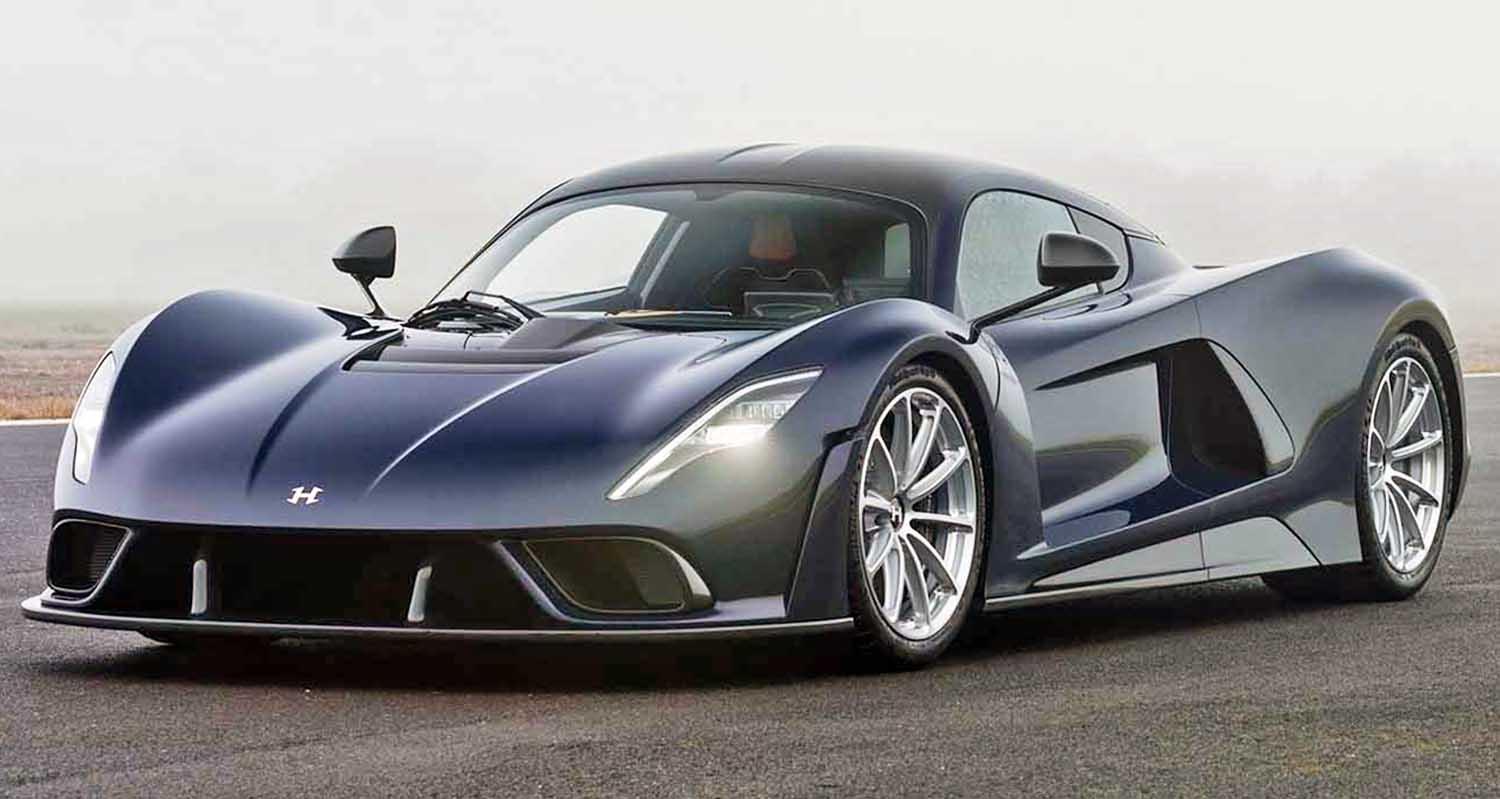
Engine – ‘Fury’ by name, fury by nature – the beating heart of Venom F5
The F5 is powered by a rear-mid-mounted 6.6-litre twin-turbocharged V8 engine that generates 1,817HP at 8,000rpm. This power, 277HP-per-litre, in a car that weighs just 1,360kg (2998lb) generates a power-to-weight ratio of 1.34HP-per-kg (1,298HP-per-ton) – the highest of any road car.
John Hennessey: “Our team built the Venom F5’s ‘Fury’ V8 motor with one vision – to deliver a unique and unparalleled driving experience. The engine commands complete respect. It’s intimidating – in a good way. It totally dominates the driving experience and keeps goading you to unleash its power, challenging you tame it.”
Patty Lanning, Vice President of Marketing, Shell Lubricants: “Shell has been eagerly anticipating this day and we are fortunate to have technical and co-engineering alliances with some of the most iconic automotive visionaries like Hennessey.
“Working behind the scenes with them on one of the most powerful and stunning road cars we’ve seen has been an incredible experience. We share a passion for performance and know that our Pennzoil Platinum Full Synthetic motor oil will protect and power the F5 across any finish line.”
No other automotive business in the world has such an exclusive focus on high output engines. Over the past 30 years the Hennessey team has evaluated, optimized and re-engineered some of the world’s most powerful road car engines. All this unparalleled experience has been harnessed for the Hennessey Venom F5, creating a supremely powerful, monstrously loud, totally intoxicating powerplant.
The Fury is a 90-degree push-rod cross-plane crank V8 engine that weighs 280kg (617lb). Using all 30 years of the Hennessey team’s knowledge, the bespoke unit features an all-new cast iron block and aluminum cylinder heads and runs an aggressive road cam providing a characteristic off-beat race car sound and feel. Each engine is hand-built with precision components crafted from high-grade metals including aluminum, titanium and Inconel. These include the crankshaft, pistons, valves and connecting rods.
A unique intake manifold design places the intercooler between the plenum and cylinder heads allowing the inlet air temperatures from the turbos to be greatly reduced before the charged air enters the combustion chamber, resulting in greater air density and enhanced power efficiency. The Fury’s multi-stage dry sump oil system uses Pennzoil 10w60 synthetic motor oil to deliver optimum performance right up to its 8,500rpm (in F5 mode) redline.
Additional power is delivered by two bespoke-built high-output precision ball-bearing turbochargers with 3D printed titanium compressor housings and 76mm (3-inch) billet aluminum compressor wheels. Set right at the rear end of the engine bay sits a bespoke stainless-steel and Inconel exhaust system, which is treated with Cerakote to protect the engine bay from excess heat.
Cerakote is a ceramic-polymer treatment that is often applied to the inside of gun barrels to protect from heat and wear. By coating the underside of the engine bay cover, rear deck, and the entire exhaust system, the impact of heat on each part can be reduced significantly.
Fury lives up to its name, the engine is loud, immensely powerful and offers abundant torque – 1,617Nm (1,193lb-ft) at 5,500rpm. The powertrain exhibits an extremely flat torque curve, meaning that the F5 produces high levels of pulling power from very low down in the rev range.
The F5 uses a specially-designed longitudinally-mounted semi-automatic gearbox with steering wheel-mounted paddle shifters. Having evaluated all potential options, the Hennessey team chose the only option capable of transferring the F5’s furious torque to the road – a single-clutch CIMA gearbox with seven ratios.
The set-up features close ratios at the lower end for rapid acceleration, with longer higher ratios to achieve a top speed in excess of 500kph (311mph). This means that the F5 offers an engaging drive at normal road speeds but can also hit record-breaking numbers. While the top (7th) ratio has a theoretical top speed of 534kph (332mph), the Hennessey team does not plan to hit this speed, it simply allows sufficient scope to pass the 500kph target.
Gear ratios and theoretical top speeds for the F5:
- 1 – 3.133 – 115kph (72mph)
- 2 – 2.100 – 172kph (107mph)
- 3 – 1.520 – 237kph (148mph)
- 4 – 1.172 – 307kph (192mph)
- 5 – 0.941 – 383kph (239mph)
- 6 – 0.784 – 460kph (287mph)
- 7 – 0.675 – 534kph (334mph)
- R – 2.875 – 117kph (73mph)
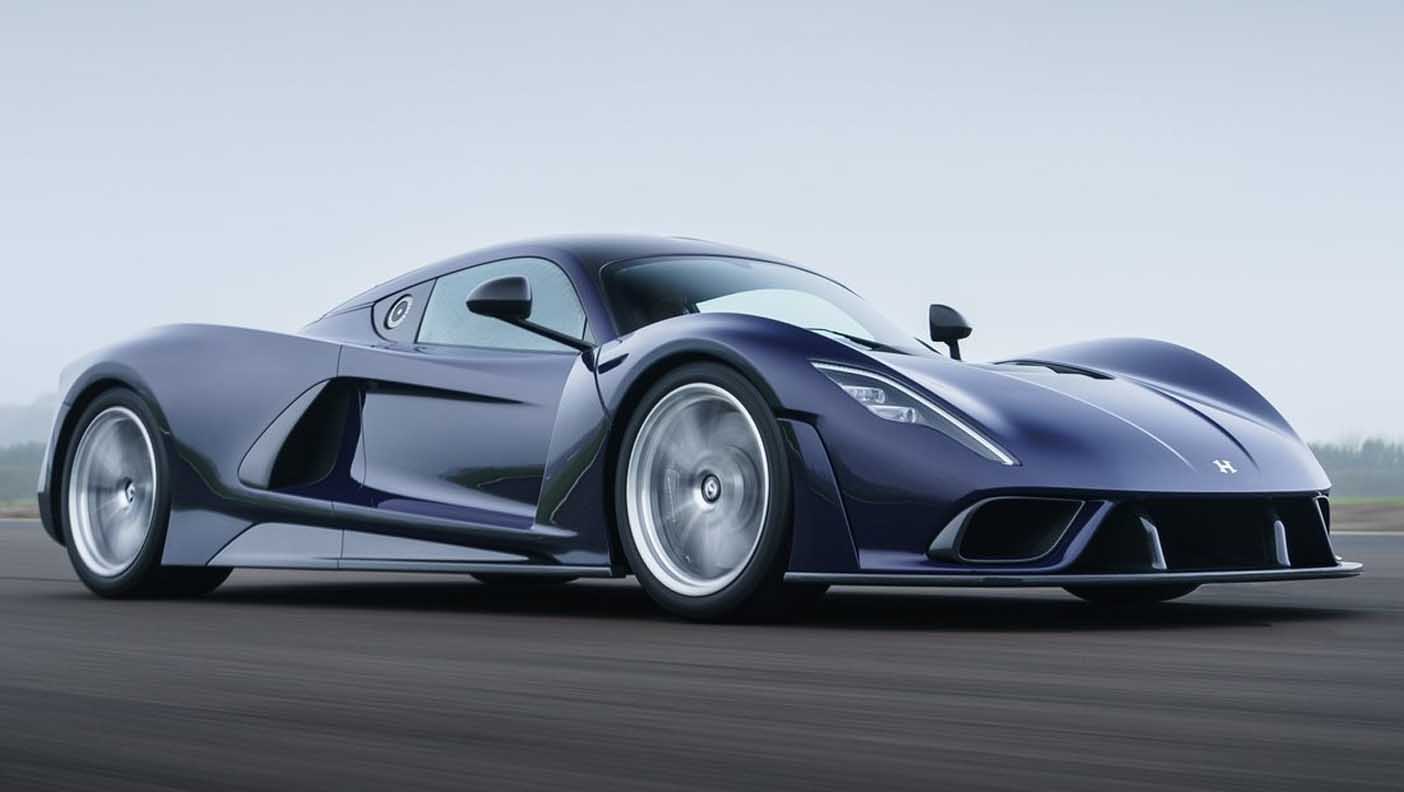
Core strength and nimble handling enabled through ultra-lightweight, high-strength carbon fibre body
At the core of the F5 is an ultra-lightweight carbon fiber monocoque that tips the scales at just 86kg. This achievement sets the tone for the rest of the car where lightness features in every component to achieve the 1,360kg (2,998lb) total dry vehicle weight.
The all-new Hennessey designed carbon chassis features an intricate carbon weave in a herringbone pattern down the center line of the car. Molding the carbon fiber interior and exterior parts required more than 600 separate bespoke pieces of tooling. During the car’s three-year engineering development significant time has been spent on perfecting the chassis and body of the car to achieve lightness, leading torsional rigidity, and purpose-led beauty.
The exterior body panels are also constructed from high-strength carbon fiber for weight saving. The lightweight doors and door sills highlight the extent of carbon fiber engineering that features on the F5. By integrating the sills as part of the door structure, the Hennessey team avoided the ingress and egress challenges of some other hypercars.
The carbon fiber tub also plays an important structural role, which is clear to see within the engine bay. Here, a pair of substantial braces link the double wishbone suspension directly to the monocoque. This transfers forces to the exceptionally rigid carbon fiber shell, aiding to the car’s stability, road holding and predictable handling even at high speed and under extreme cornering loads.
The intrinsic strength of carbon fiber enhances occupant safety in the event of an accident. The carbon fiber body joins an aluminum subframe where engine and suspension components connect. The subframe components are engineered to deform in the event of an accident to absorb the energy of an impact and protect the passenger cell.
Exterior design – function defines form – designed in the pursuit of speed
The exterior design of the F5 revels in simplicity, combining minimal sharp lines with smooth flowing surfaces. Every part of the car’s sculpted body informed by the car’s function – to be fast, agile and stable at all speeds.
Nathan Malinick, Hennessey Director of Design: “We started our design journey with a goal to be the fastest car in the world. As the F5 evolved and our targeted dynamic capabilities were defined, we relied on a guiding principal that function defines form to sculpt the exterior. We worked hand-in-hand with our engineering team to ‘skin the beast’ with aerospace-inspired forms to create a machine that is highly capable technologically, but that is also beautiful.”
The exterior of the F5 is shaped by aerodynamics and inspired by the pursuit of speed. The entire car exudes determination, purpose and drama from every direction with sculpted aerodynamic ducting and sharp, powerful lines to give the car a real sense of speed and intent, even while stationary.
By looking to fighter jets for inspiration, as control and precision at speed is central to their function, the front of the car is dominated by aerodynamic features. Sitting squat and low to the road the front profile of the F5 sees a pair of air intakes pushed towards the outer lower edges of the car, perfectly framing the cockpit above. The front clam shell is intersected by two supporting pillars of the carbon diffuser, which appear like ‘fangs’ converging below the newly-designed Hennessey ‘H’ logo. The headlights are long and sleek, stretching up and outwards, broadening as they rise towards the apex of each wheel arch. Both units have a clear ‘F’ shape and feature a subtle ‘Hennessey’ script logo embossed within.
Behind the front splitter, the bodywork channels air under the flat floor towards the diffuser at the rear. Two large ducts at either side of the front bumper force air towards the brakes for cooling, while the front clam has a steep rake that forces air upwards and over the door mirrors for minimal drag. On both corners at the front, two subtle ducts separate the airflow moving it away from the wheels, to reduce drag-inducing turbulence. Discrete cut-outs behind the front wheels create high-pressure zones to clean up body-side air-flow, while similar ducts on the rear haunches allow airflow in to cool the F5’s gearbox and powertrain.
Viewed from the side, the car’s compact dimensions are most obvious. At 4,666mm (183.7 inches) long and 1,971mm (77.6 inches) wide, the F5 is only marginally larger than its spiritual predecessor, the Venom GT. Maintaining this compact, taught form, the bodywork wraps tightly around the forged aluminum wheels (19-inch front / 20-inch rear), accentuating the low, speed-optimized stance. The bodywork looks as though it is shrink-wrapped around the core components of the car – particularly when in its ‘low’ road setting – ride height can be adjusted at front (75 – 140mm / 3 – 5.5 inches) and rear (85 – 160mm / 3.3 – 6.3 inches) to raise the car over speed bumps, or for loading, etc).
At the rear the F5’s spoiler is subtle, a cut-out that sits just above the bodywork and the rear deck of the car, allowing air to flow above and underneath enhancing stability at high speed while boosting downforce for regular road driving. Customers will be able to order a ‘track pack’ that includes a more aggressive front splitter and a rear mounted wing, which replaces the rear spoiler to deliver greater downforce.
The car’s aerodynamics were refined using computational fluid dynamics (CFD), the F5’s aero features were repeatedly refined to ensure that the passive aerodynamic setup and drag coefficient of 0.39Cd will keep the car stable at high speeds, while producing sufficient downforce to make it feel ‘planted’ when on the road.
The rear panel, with the distinctive rear lamps set at each corner, is the largest piece of CNC machined carbon fibre in use on a road car. The rear lamps are an abstract ‘5’ shape, linking to the front lights to subtly reference ‘F5’. A void sits at the center of each lamp, which surround hollow carbon fiber air channels that pull heat from the engine bay.
Positioned centrally, just below the rear deck, are four ‘Cerakoted’ black exhaust pipes. Coloured black, the pipes don’t detract from the drama of the rear end, only becoming a noticeable feature when flames spit as the engine revs peak. The bodywork pinches in beneath the number plate, terminating where it meets the deep, wide carbon-fiber diffuser, which ‘kicks out’ air that’s been accelerated beneath the F5’s flat floor.
Viewed from above, the F5’s carbon tub is clearly visible. The striking weave of the high-grade lightweight carbon fiber is left visible, extending frontwards down each door pillar and rearwards over the engine bay cover. Vents all the way down this cover help to keep the V8 engine cool, while the gold leaf-lined engine bay helps to reflect heat, assisted by venturi-effect airflows.
The entire underside of the rear deck is treated with the ceramic polymer Cerakote for additional heat management. The engine is finished in polished aluminum with ‘Venom F5’ machined into both sides, with bright yellow cam covers that sport the Hennessey script and ‘Powered by Pennzoil’. Atop the motor sits a large manifold that carefully controls the fuel mixture to the powertrain. Moving rearwards the F5’s black exhaust manifolds emerge from down low, and merge towards the back of the engine bay where two large turbochargers sit between the engine and the short quad exhaust outlets.
The first Hennessey Venom F5 is a customer car finished in ‘Speed Devil Blue’ accented by exposed carbon fibre and highlighted with brushed metallic forged aluminum wheels.
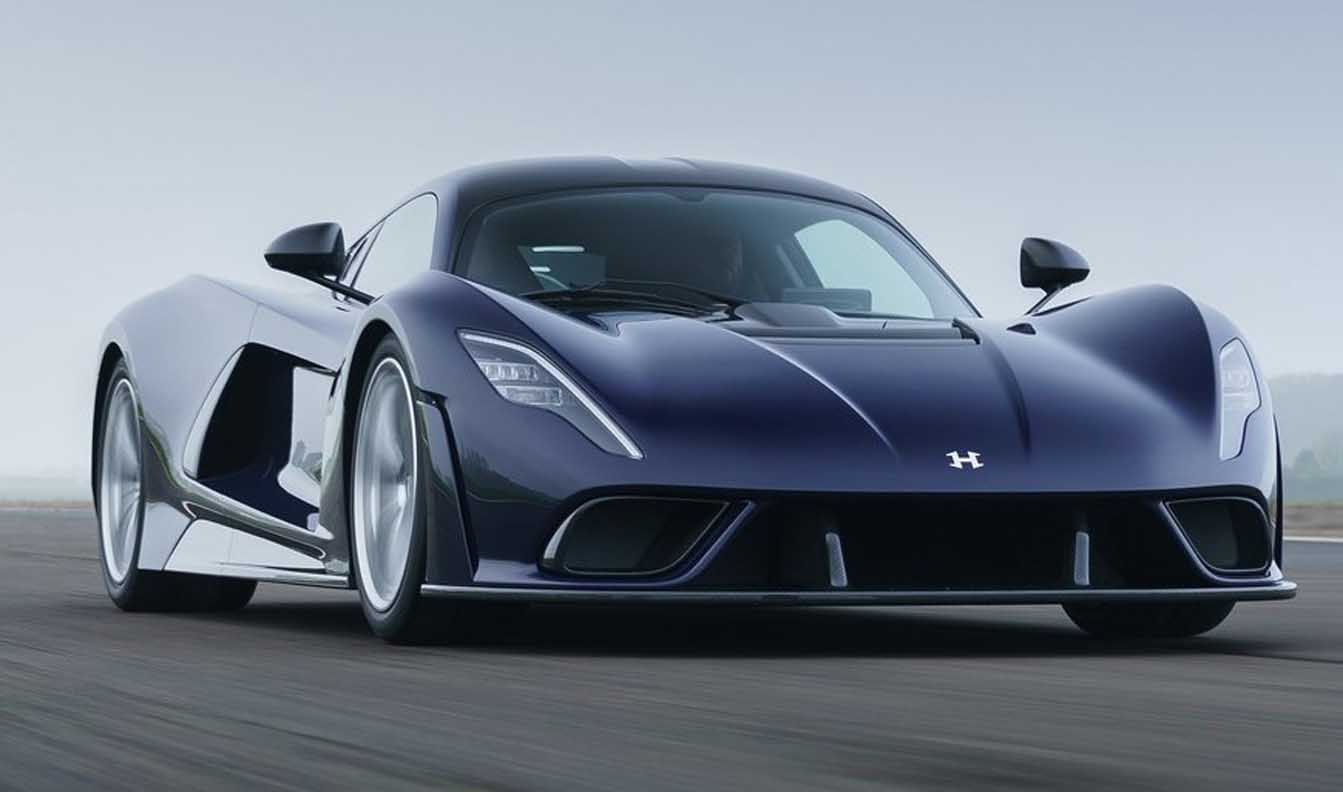
Driver-focused cockpit is inspired by fast jets
The interior design of the F5 is simple, lean and elegant. Designed to evoke the spirit of fast aircraft cockpits, the space exhibits minimal distractions, while promoting maximum driver visibility tactility and functionality.
Nathan Malinick, Hennessey Director of Design: “At 500kph, you’re more of a pilot than a driver. This guiding principle informed our approach to the interior functionality, layout and mood of the F5. Our instrumentation is inspired by fighter jets and NASA rockets, our dash features no buttons to ensure absolute driver focus, and our materials are of the highest quality to ensure the interior echoes the engineering integrity and performance capabilities of the car.”
On the inside the F5 proudly exhibits premium simplicity, there is nothing inside the car that is peripheral to the act of driving. This is helps to save weight, and to promote total driver focus – just like a pilot sitting in a fighter jet cockpit. The interior is true to the car’s roots displaying raw carbon fiber throughout, but with hints of luxury from leather panels on the doors, dashboard and seats.
As the driver opens the F5’s butterfly door, they are greeted with a bespoke carbon fiber steering wheel, which is inspired by an aero plane ‘yoke’ and an F1 racing car’s steering wheel. To maximize driver visibility of instrumentation and the road ahead, the top of the wheel is eliminated, while also encouraging proper hand placement for optimal steering wheel control. The parts of the steering wheel where the hands naturally grip, are leather-clad, the rest is exposed carbon-fiber. On the wheel are tactile controls for lights, windscreen wipers and turn signals, while in the center sits a green switchable mode dial that lets the driver select from Sport, Wet, Drag, Track, and F5 modes.
Behind the wheel on the top of the steering column sits a 7.0-inch instrument display cluster. Inspired by the head-up display screen in a jet fighter, the screen changes with each drive mode, displaying a different color and content layout. At all times the screen displays vehicle speed and engine revs alongside oil, coolant and engine temperatures.
The carbon fiber bucket seats are cushioned with leather-clad pads that adhere to the ‘function defines form’ design philosophy and contribute to a lighter seat. The F5 accommodates two people in comfort providing optimum support for cruising or faster cornering. They both cosset the occupants during spirited driving and provide comfortable support under extreme acceleration and at high speed.
The interior surfaces are a balance of leather and satin-finish carbon fiber. The dashboard features leather and aluminum inserts overlaid on the exquisitely finished carbon fiber. On each door panel sits a lightweight carbon fiber door handle that ‘floats’ above the leather highlighting the union of optimal performance and luxury. The door handles are accented by aluminum inserts that depict the Texas and US flags, clearly communicating the car’s proud American heritage.
Seated in the cabin the driver is surrounded by a belt of gloss carbon fiber, which subtly contrasts with the satin carbon fiber and leather. Looking around the cabin the driver’s eyes are naturally drawn down to the slimline carbon fiber center console upon which sit the function buttons for the windows, hazard lights, parking brake, vehicle lift system and door locks.
As the eye follows the center console up the dashboard, there are three simple circular buttons for gearbox operation ‘N’, ‘D’ and ‘R’ above which sits a tactile circular controller with a 1.3-inch digital screen set within it, which is used to adjust the car’s HVAC systems. Touch screen activation paired with a rotating machined aluminum bezel allows the temperature, airflow and intensity to be adjusted. As the center console accelerates upwards towards the dashboard, two circular air vents are visible, stacked one above the other.
Above the central vents sits a 9.0-inch Alpine touchscreen infotainment system. This gives the driver and passenger access to Apple Car Play and Android Auto with satellite navigation, stereo functionality and Bluetooth phone pairing for hands-free phone and multimedia use. The integration of Apple Car Play and Android Auto future-proofs the F5’s infotainment interface to ensure the system always remains up-to-date.
The leatherwork is supplied by Muirhead, one of Europe’s oldest tanneries. It is applied to hand-crafted interior trim alongside touches of Alcantara, which covers the headlining and stowage compartments to add a further hint of luxury and help manage interior sound levels.
The first Hennessey Venom F5 is a customer car and is trimmed to their specification in ‘Butterscotch’ leather with black leather and Alcantara accents. There are also a few touches of green in the car, which are placed as a nod to the mantra ‘green means go’. Green is also accented on the ‘drive’ button, the mode selector on the steering wheel, and is accented in leather on the seat bolster – all of which are areas that the driver interacts with directly.
The F5’s pedals are machined from solid aluminum, providing yet another touchpoint that exudes quality and is reflective of the lightweight nature of the F5. The accelerator pedal is narrow and floor-hinged, while the brake pedal is wide and hinged from above. In the passenger footwell, there is a small compartment that stores a tool kit by default, but customers can also personalize the storage space to meet their own requirements.
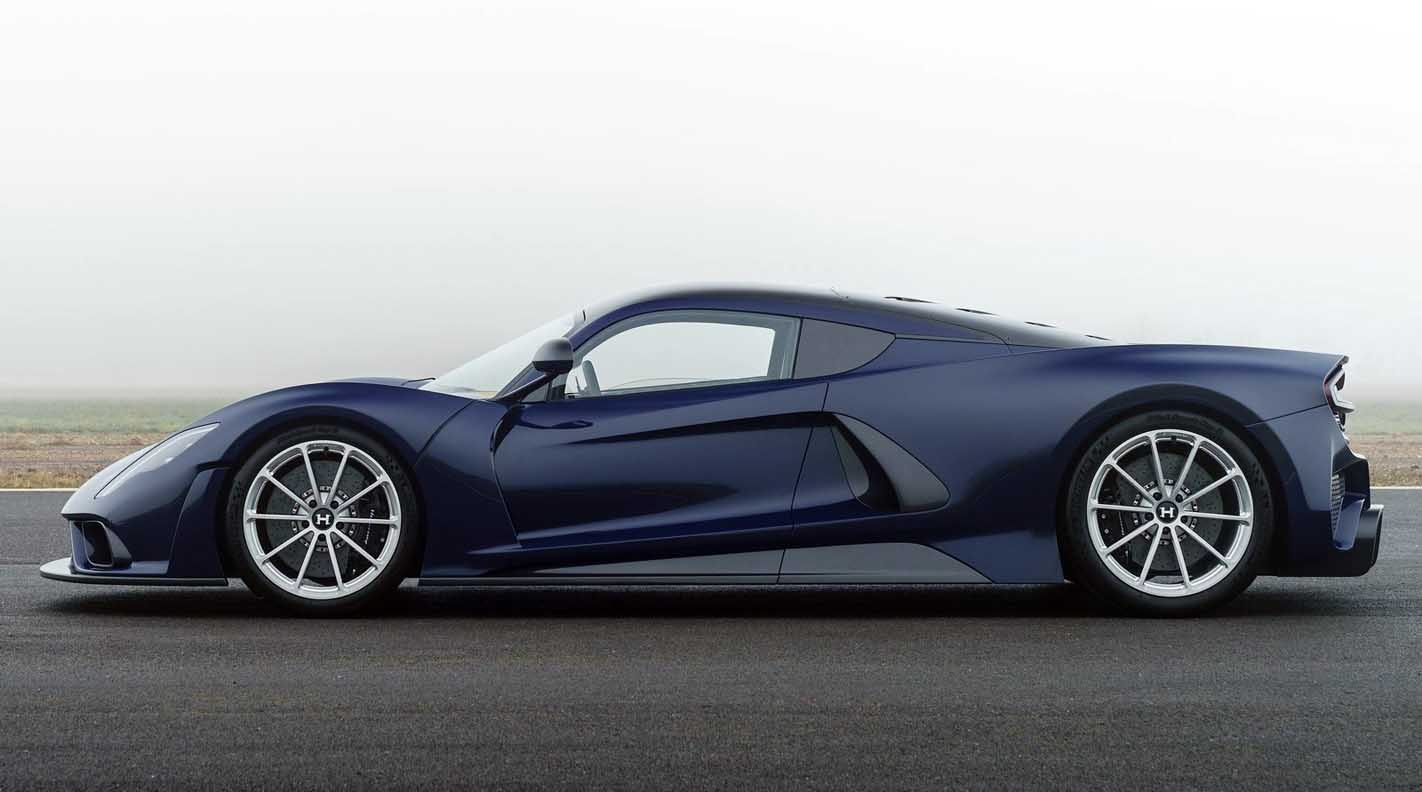
Hennessey Venom F5 – technical specification
- Configuration
- Rear-mid-engine coupé
- LHD and RHD available
- Rear-wheel drive
- Dimensions
- Length: 4,666mm (183.7 inches)
- Width (excluding mirrors): 1,960mm (77.2 inches)
- Width (including mirrors): 1,971mm (77.6 inches)
- Height (from ground): 1,131mm (44.5 inches)
- Wheelbase: 2,800mm (110.2 inches)
- Front track: 1,574mm (77.6 inches)
- Rear track: 1,584mm (62.0 inches)
- Dry weight: 1,360kg (2998lb)
- Kerb weight: 1,385kg (3053lb)
- Ride height (adjustable) – using HLS
- LOW: Front 75mm (3 inches) / Rear 85mm (3.3 inches)
- HIGH: Front 140mm (5.5 inches) / Rear 160mm (6.3 inches)
- Engine
- Name / type: Hennessey V8 twin turbo ‘Fury’
- Configuration: V8
- V-angle: 90°
- Capacity: 6,555cc
- Bore: 104.8mm (4.1 inches)
- Stroke: 95.3mm (3.8 inches)
- Compression ratio: 10:1
- Max power: 1817HP @ 8,000rpm
- Power-to-weight ratio: 1,298HP per ton (1.34HP per kg)
- Max torque: 1,617Nm (1,193lb-ft) @ 5,000rpm
- Maximum rpm: 8,200rpm (8,500rpm F5 mode)
- Valve train: Pushrod & Rocker
- Turbocharger: Precision ball bearing twin turbochargers (76mm billet aluminum compressor wheels)
- Exhaust system: Stainless steel
- Lubrication system: Dry sump
- Engine block: Cast iron
- Cylinder heads: Aluminum cylinder heads with canted titanium intake valves
- Connection rods: Forged steel
- Valves: Inconel exhaust valves with dual valve springs
- Total engine weight: 280kg (617lb)
- Power density: 277HP-per-litre
- Performance
- 0 – 100kph (0-62mph): 2.6 s
- 0 – 200kph (0-124mph): 4.7 s
- 0 – 300kph (0-186mph): 8.4 s
- 0 – 400kph (0-249mph): 15.5 s
- Top speed: > 500kph (>311mph)
